

Contents
8
Growing Through the Pain
Envoy Andrew McKerrow’s journey has come full circle. From a childhood shaped by struggle and addiction, to a life of faith, healing and leadership.
18 A Resilient Spirit
Gaylene Harawira shares how her relationship with God has carried her through breast cancer and single motherhood to a calling to care for her community.
20 21 Years of SPPU
The Salvation Army Social Policy and Parliamentary Unit has dedicated over two decades to addressing social concerns and forging a path towards the eradication of poverty.
26 The Pursuit of God
The final part of Jules Badger’s series on Psalm 23, reflecting on how God pursues us through every season.
28 The Homeless World Cup
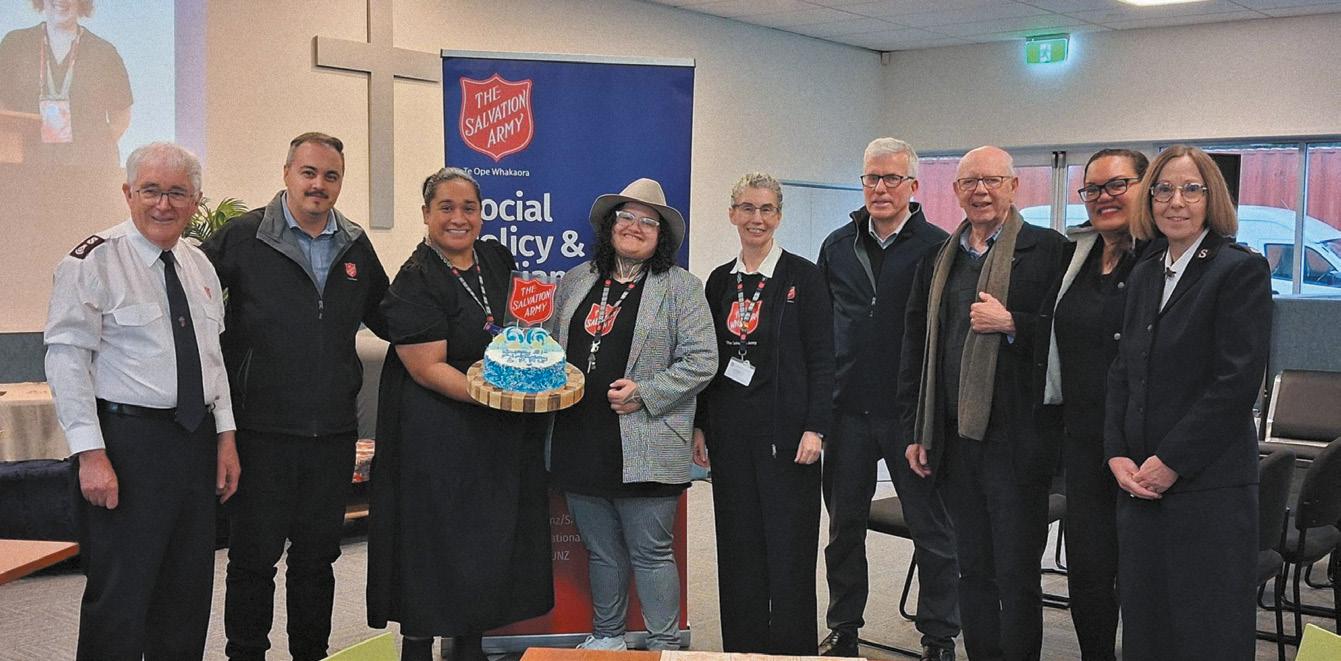


Lieutenant Petero Yavala from Fiji is heading to Oslo, Norway, to support players through chaplaincy at the HWC football tournament, championing global hope and social change. 7
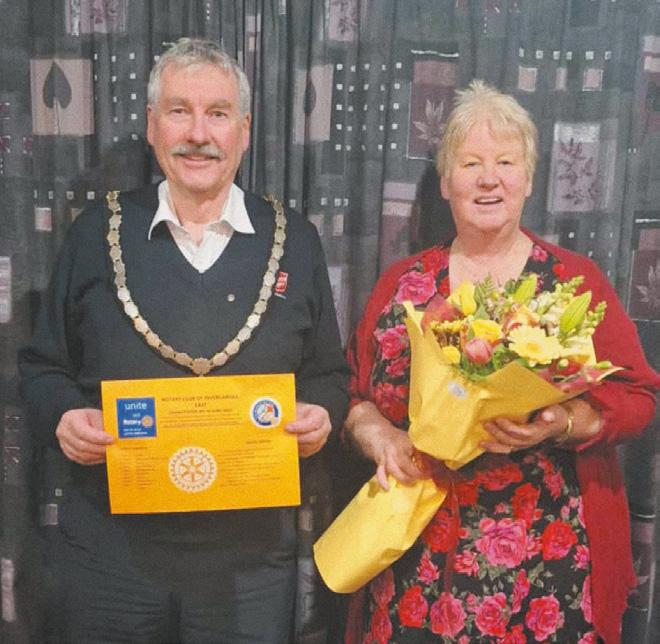
SALT Magazine
The Salvation Army New Zealand, Fiji, Tonga and Samoa Territory
Territorial Commander
Commissioner Janine Donaldson
General
Lyndon Buckingham
Founders
Catherine and William Booth
Editor
Vivienne Hill
Graphic design
Sam Coates, Nicole Gesmundo, Lauren Millington
Staff writers
Jules Badger, Kelly Cooper, Captain Rachel Montgomery
Proof reading Colleen Marshall, Major Glenys Fairhurst
Connect with us saltmagazine.org.nz SaltMagazineNZ @SaltMagazineNZ salvationarmynzfts Territorial Headquarters, 204 Cuba Street, PO Box 6015, Marion Square, Wellington 6141 p: (04) 384 5649
e: salt@salvationarmy.org.nz

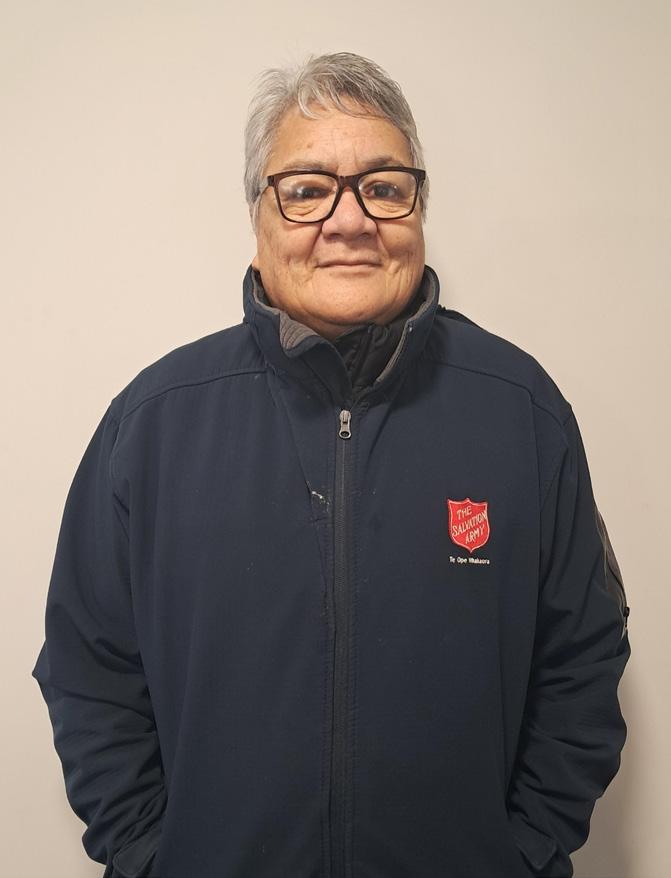
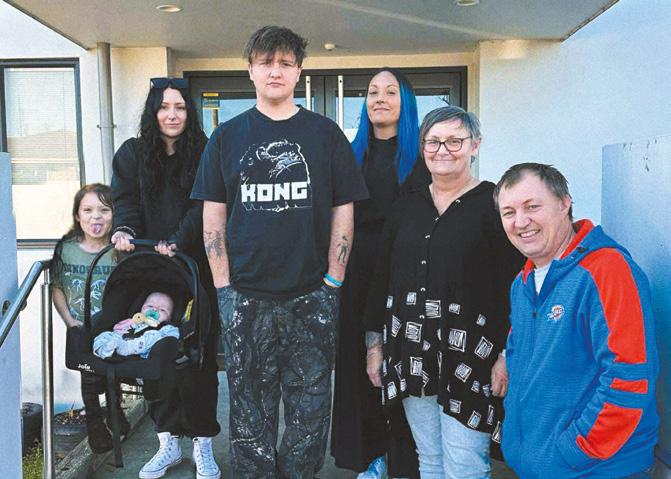
Subscriptions mailorder@salvationarmy.org.nz
Print Management MakeReady
Publishing for 141 years Volume 3, Issue 26 ISSN 2816-1351 (Print) ISSN 2816-136X (Online)
All Bible references from the Holy Bible, New International Version, unless otherwise stated.
Views and opinions expressed do not necessarily represent those of The Salvation Army.
Articles are copyrighted to The Salvation Army, except where indicated, and may be reprinted only with permission.
Agents of Resilience
he Bible has a lot to say about resilience, offering numerous examples of individuals who faced tremendous trials and adversities, yet trusted God through it all. This trust enabled them to persevere, even when situations appeared hopeless.
In fact, some of the most compelling testimonies you will read in this edition of SALT are from those who have withstood trials and difficulties, discovering God’s strength, direction and comfort.
On page 8, Envoy Andrew McKerrow shares his story of turning pain into purpose. He has allowed God to walk with him and his family through many trials, emerging without bitterness or regret. He now not only ministers as a chaplain in the racing industry but is instrumental in training other chaplains. Andrew also leads his corps family and brings comfort and support to those facing their own storms, with a healthy dose of humour.
You can also read an inspiring story of resilience on page 18, where Gaylene Harawira shares her story of overcoming difficulties and finding Jesus. She now leads a fulfilling life surrounded by her whānau and ministering
to her church family. Gaylene uses her experiences to meaningfully give back and enrich the lives of others.
In all the stories on these pages, the spirit of resilience and the support of community, whānau and church family are evident. But above all, what stands out is faith in a heavenly Father who works out his master plan in our lives, shaping us into agents of resilience.
Joni Eareckson Tada, a woman who has been wheelchair-bound for most of her adult life, once said: ‘God permits what he hates to accomplish what he loves’. This quote only makes sense when we are convinced of the merciful character of God. If we do not believe he is who he says he is, then we will doubt his ability to fulfil his promise that ‘God works all things together for good for those who are called according to his purpose’ (Romans 8:28). Allow God to turn your pain into purpose.
Vivienne Hill Editor
God is too good to be unkind and he is too wise to be mistaken. And when we cannot trace his hand, we must trust his heart. CHARLES SPURGEON

TOP FIVE
New Zealand Winter Wonders!
1 Lights (Aurora Australis)
The Aurora Australis is the Southern Hemisphere’s spectacular natural light show. The best places in New Zealand to view this winter wonder are Lake Tekapo (and its surrounding areas which are part of the Aoraki Mackenzie International Dark Sky Reserve), Otago Peninsula, The Catlins (Southland) and Stewart Island.
2 Whale Watching
Winter is prime time for whale watching, as humpback whales migrate to warmer waters, and you can spot them off the coasts of South Africa, Australia and, of course, New Zealand. You can view sperm whales all year round on the South Island’s Kaikoura coast, while orcas regularly visit Auckland’s Hauraki Gulf.
3 Unique Winter Flora
Beautiful, rare and hardy plants adorn the alpine zone of New Zealand’s rugged southern mountain ranges. Northwest Nelson and Fiordland are home to vast alpine winter flora diversity, with over 80 percent of all species found in the Nelson region. These plants are true winter wonders, having to survive extreme cold as well as windy and dry conditions.
4 Winter Festivals
The New Zealand winter is peppered with vibrant festivals that celebrate everything from snow sports to music and food. Family-friendly events include the Taupō Winter Festival with its light shows, igloo art galleries, comedy gigs, ice rink and the iconic mid-winter swim in Lake Taupō. Northland hosts a particularly quirky family fun event, called the Russell Birdman Festival.
5 Snow-Capped Mountains
The Southern Hemisphere boasts some of the world’s most stunning snow-capped mountains. These include the slopes of the Andes in Chile and Argentina, and our very own Southern Alps. Just out of Queenstown is Cardrona ski field which caters for all levels, with wide slopes as well as terrain parks. Down the road is Treble Cone, the largest ski field in the South Island, boasting the longest vertical drop and some particularly challenging terrain for advanced thrill-seekers.
What’s On?
Territorial Prayer Summit | Online and in-person
22–23 August salvationarmy. org.nz/prayersummit
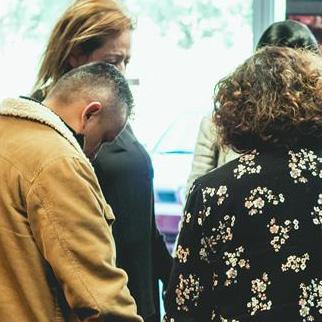
Johnsonville Corps 30th Reunion | Johnsonville 5–7 September
For more information, please register your interest to karen.white@ salvationarmy.org.nz
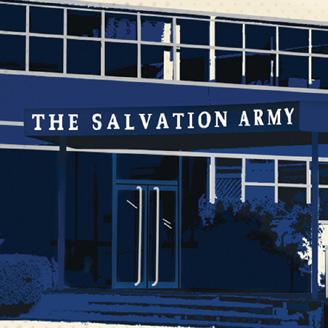
Porirua Corps 60th Anniversary | Porirua 26–27 October
For more information, please register your interest to nicki.dutton@salvationarmy.org.nz
Check out our full event calendar at salvationarmy.org.nz/events
There’s no such thing as bad weather, only the wrong clothes.
BILLY CONNOLLY

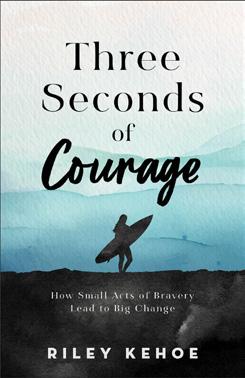
Three Seconds of Courage
Self Help/Spirituality | Riley Kehoe | Baker Group Publishing
In her compelling debut book, Riley Kehoe weaves together personal experience, heartfelt wisdom and uplifting encouragement to inspire readers toward a life of courage and faith. Drawing from her own journey, including surviving the 2004 Indian Ocean tsunami and reviving a drowned man through CPR, Riley shares powerful personal stories of facing fear and embracing courage. With honesty and hope, she invites readers to consider the profound impact of just three seconds of courage: the kind that moves us to reach out, take a bold step or extend forgiveness. This is a relatable read for young women who long to live bravely and purposefully for Jesus. (Reviewed by Kelly Cooper)

Holy Here/Holy Ground
Prayer application | Available in the App stores
A collaboration between 24-7 Prayer USA and Civil Righteousness, Holy Here (previously called Holy Ground) is a prayer walking app that tracks people’s prayers from around the globe! As you participate in a prayer walk, the app will note where you have travelled and will mark it on the shared prayer map, which shows where else in your area has been prayed for. A great app for those who want to incorporate more ‘active’ prayer in their rhythms, it is a really fun way to notice and appreciate the value of praying for your neighbourhood, workplace or city! (Reviewed by Holly Morton-Chong)
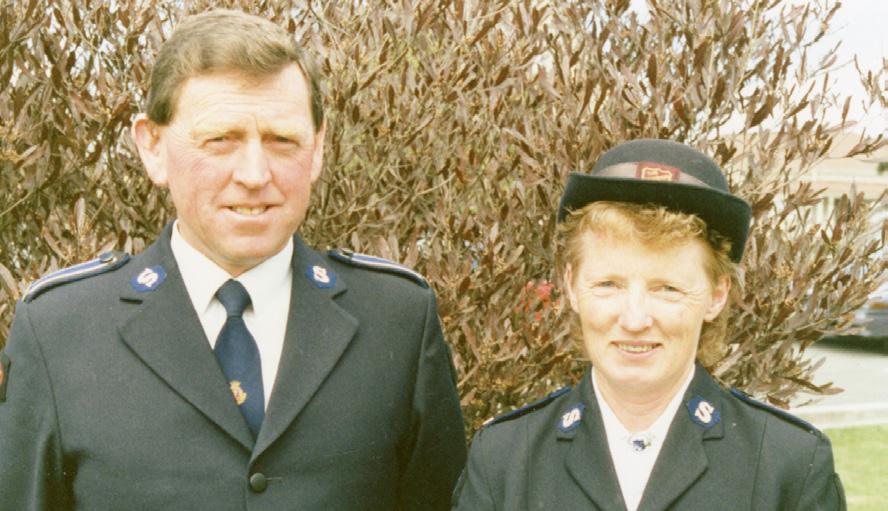
Do You Know These People?
If you recognise the people in this photo, we’d love to hear from you. Email: archives@salvationarmy.org.nz
SOUP QUIZ
1 Which ancient civilisation is credited with early soup-making using clay pots and fire?
2 The word ‘soup’ comes from the French word ‘soupe’. What does ‘soupe’ mean?
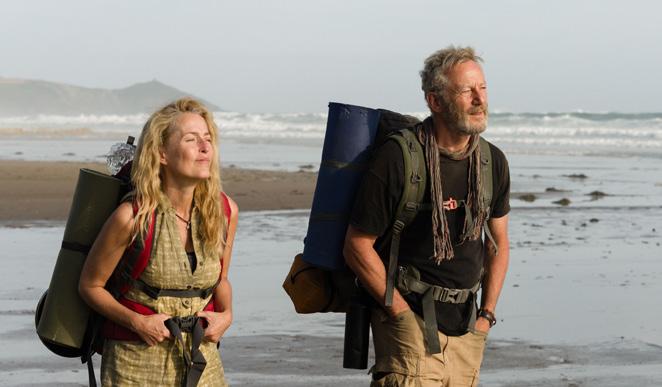
The Salt Path
Biographical drama | Directed by Marianne Elliott | M (drug use, offensive language)
When a couple’s world crumbles, they do what anyone would do and walk the 1014 km southwest coastline of England. The Salt Path follows Moth (Jason Isaacs) and Raynor (Gillian Anderson) Winn who, after losing their home to a business deal gone wrong and a subsequent terminal diagnosis, pack their bags and start walking. The trail is epic, showcasing England’s lush scenery. Originally a memoir, the thin dialogue is spread across the film, relying on the cast to convey the gravity of the situation purely through emotion, which works at times but falters at others. Overall, perseverance shines through, as a devoted couple push through adversity and make it out the other side. A wholesome watch. (Reviewed by Jenna Martin)
3 In medieval Europe, what stale food item was soup often served over?
4 Who was the famous French chef who popularised refined soup-making techniques?
5 What is the name of the thick hearty soup made with clam and potatoes? Answers page 32
SALVATION ARMY PRAYER
Fiji corps and Community Ministries; Family Care Centres and outposts in Fiji; Red Shield House, Suva; Fiji School for Officer Training; sewing programmes in Labasa and Suva; Suva Court and Prison Service; Tiny Tots Kindergartens around Fiji; Territorial Finance Department; India Central Territory; India Eastern Territory; and India Northern Territory.
INTERNATIONAL PRAYER
• Eritrea—Located on the Red Sea, Eritrea is governed by a totalitarian regime and is one of the most secretive and isolated countries in the world. The population is nearly evenly divided between Sunni Muslims and Orthodox Christians. About three percent hold evangelical Christian beliefs, which the government deems illegal. More than 200 evangelical believers are known to remain in prison. Pray for the hundreds of evangelicals who have been imprisoned for their faith, often without trial. Pray that imprisoned believers will encourage one another and share the gospel with fellow prisoners. Pray that formerly imprisoned Christians will experience the Lord’s provision in physical, emotional and financial healing.
• Sudan—For nearly 50 years, the Sudanese Government has conducted a brutal campaign to eradicate Christianity, destroying churches and imprisoning Christians. Most Christians who have not fled the current violence must meet underground in small groups. Pray for the encouragement of Sudanese Christians and for increased fellowship among those meeting in small groups. Pray that Christians in the Nuba Mountains region will be a beacon of hope to those fleeing extremist violence. Bibles are scarce, pray for increased access to God’s Word.
Source: Voice of the Martyrs.


Prayer Focus: The War in Ukraine
The conflict between Ukraine and Russia continues, marking it as the largest war in Europe since World War II. The past three and a half years of war have resulted in mass civilian casualties, infrastructure destruction and widespread displacement.
The Salvation Army has been providing relief and support in both Ukraine and Russia. In Ukraine, The Salvation Army has been actively involved in emergency relief work, distributing essential supplies such as food, clothing, blankets and hygiene items to those affected by the conflict. Safe spaces for refugees have been established, with The Salvation Army providing warm meals and offering shelter as well as emotional and spiritual care. This includes extra support during Ukraine’s harsh winter conditions, with the provision of heating assistance, warm clothing and bedding to help families cope with the cold. Recognising the psychological impact of the war, The Salvation Army also offers counselling support to help individuals deal with trauma.
The Salvation Army in Russia is focused on providing humanitarian aid to those in need, including food and clothing, as well as working within local communities offering support and resources. Help in navigating the challenges brought about by the conflict is a key focus, alongside offering hope and comfort, counselling and spiritual input.
• Peace and resolution: Lord, we pray for a peaceful resolution to the conflict, and for wisdom and strength for leaders making critical decisions.
• Protection for civilians: Lord, we pray for the safety and protection of civilians caught in the crossfire, especially those in heavily affected areas.
• Healing and comfort: Lord, we pray for those who have experienced the terrible loss of loved ones. May they know the comfort of your abiding presence. For those who have been injured, we pray for healing and strength.
• Support for refugees: Lord, we pray for support and resources for refugees and displaced persons, so that they can rebuild their lives.

Microwave Brownie
This is a delicious, easy, quick chocolate brownie recipe, perfect for a winter’s evening with whipped cream on the side and a pot of hot tea!
Cooking time: 5 minutes; preparation time: 5 minutes | Serves up to 10
Ingredients
• 1 cup sugar
• 100 grams butter
• 2 eggs
• 2 tsp vanilla extract
Method
• ¼ cup cocoa powder
• ¾ cup of self-raising flour
• Optional: a handful of chocolate drops
Soften the butter, and then cream the butter and sugar together. Add the eggs and vanilla and mix well.
Stir the flour and cocoa together, then fold into the egg mixture. Mix well.
Grease a round glass dish (at least 20cm) with butter or oil.
Pour the brownie mixture into the dish.
Microwave for 5 minutes on high.
Allow to cool for 5 minutes.
Sprinkle with sifted icing sugar.
Serve while still warm with whipped cream or vanilla yoghurt.
Source: Jules Badger

Winter Appeal
Winter deepens hardship for struggling Kiwi families, with rising costs, housing stress and emotional strain. The Salvation Army’s Winter Appeal offers vital support—food, warmth, shelter and counselling. Through public generosity, we bring hope, dignity and connection. Our wraparound care helps families survive the cold and rebuild. Join the mission to bring warmth and compassion this winter.
WORD OF THE MONTH Manumalo (Samoan) victory.
Growing Through the Pain
From a gambling addiction as a young person to meeting God in a pub toilet, through ministry burnout to the shock loss of a beloved child, it’s fair to say that Envoy Andrew McKerrow has been through the ringer. However, today he’s loving life, grateful for the joy his precious family brings him, fulfilled in ministry and service, and above all else, enjoying a depth of relationship with God he didn’t know was possible.
WORDS Jules Badger
ndrew McKerrow just cannot get away from Belfast! His story weaves in and out and around the Christchurch suburb he was born and bred in. Despite multiple attempts to ‘escape’ Belfast, Andrew now accepts it’s where God wants him.
‘When I met my wife Kim, she was living three doors down from the house I grew up in, and now, the church we lead (Christchurch North Corps) is also on the same street. I’m back where I started,’ laughs Andrew.
Typical…
Andrew explains that Belfast was quite a different place during his childhood to what it is today.
‘Belfast was your typical freezing-worker town then— that’s what defined it. We used to call it “Smell-fast” because it was so stinky from the two big freezing works and the wool scour just down the road.’
Growing up in the 1970s and 80s, Andrew describes his dad as ‘your typical rugby, racing and beer’ man.
‘Dad’s patterns were work hard, and when you were finished work, head down to the local pub. He’d be there on Thursday, Friday and Saturday nights, and then there’d be the races and placing bets on the weekend. When I look back it wasn’t typical, but it felt normal, to me anyway. It’s all I knew.’
Andrew was the local paperboy and would stop off and play the pokies along his route. There were no gambling age restrictions at that time and pokie machines were in hamburger bars and even some fish and chip shops.
‘Dad and I began to fight a lot. I was about 12 or 13 when it escalated, and I started looking for my own coping mechanism to deal with that. When I was 14, the woman who ran the TAB would let me sneak in the back and place a bet. But it was the pokies that were my poison. When I was 16, I had already lost a job because I was stealing from my employer and gambling at lunch time. I don’t recall many days between the age of 13 to 20 when I didn’t gamble.’
‘… it was the pokies that were my poison. When I was 16, I had already lost a job because I was stealing from my employer and gambling at lunch time.’
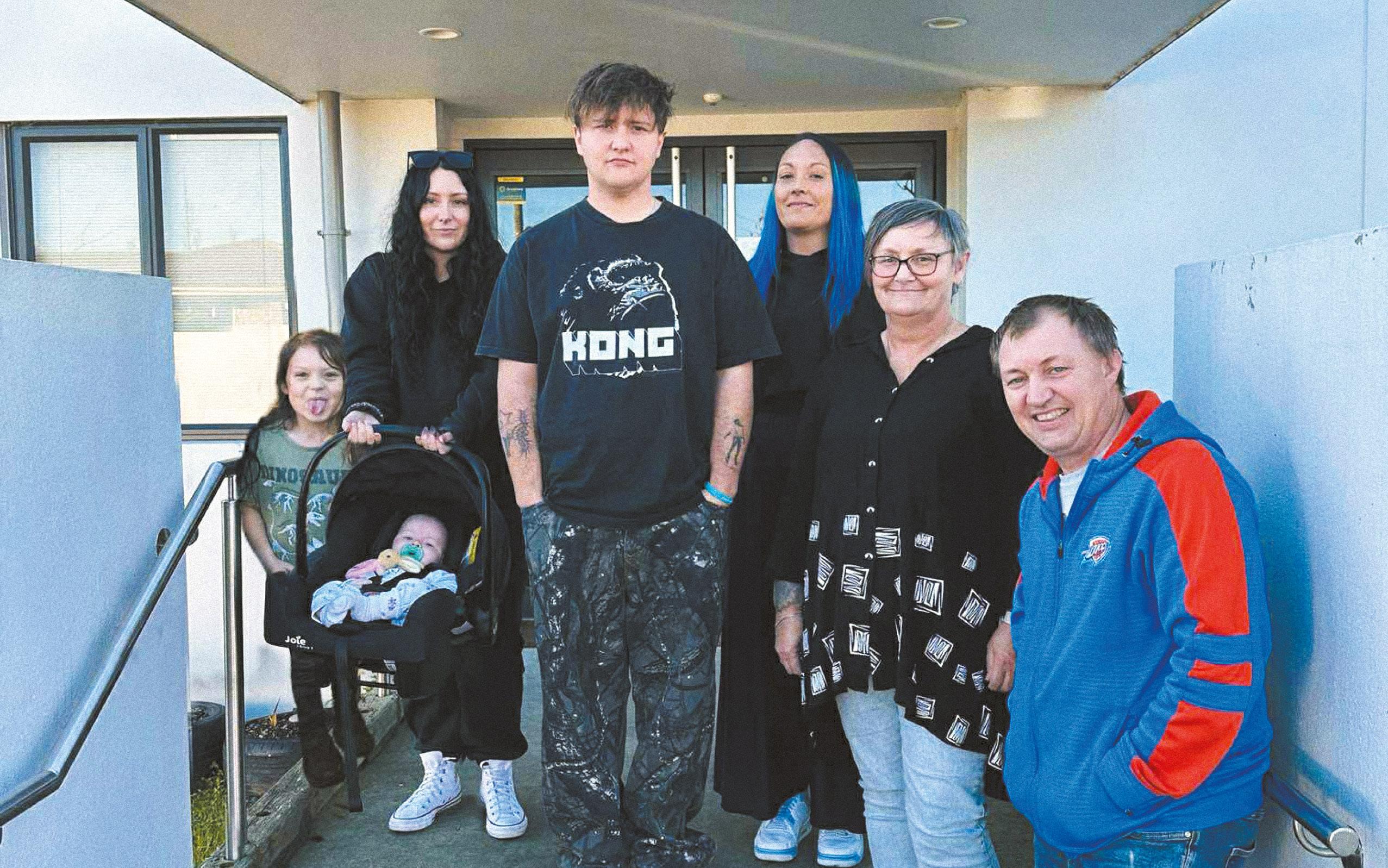
Andrew was stunned and fell to his knees. ‘I said to God, “Okay”. I didn’t know what it all meant, but I knew I’d met God.’
Are you done?
As well as gambling, addiction to alcohol was strong in Andrew’s family, and he followed suit. One morning Andrew was at the pub, having spent the money for his rent on the pokies the night before.
‘I walked into the bathroom and just had this crazy encounter with Jesus. I didn’t see it coming and I had no context for it really. All of a sudden there was this voice in my head, and it just asked this one question, “Are you done?” And it just completely shattered me because I knew I was. And so I said, “I am done”. I didn’t know God, but I knew I was talking to God.’
In the moments that followed, God showed Andrew a vivid picture of a beautiful car wrapped around a tree. Andrew was standing beside the twisted wreck full of shame.
‘God said, “That’s your life, Andrew. You think you’ve damaged it so badly that it’s no good to anyone and can’t be repaired. But I’m asking you to give me your life and trust me to fix it up and do something good with it.”’
The very next day, Andrew met a recovering gambler at the bus stop, who invited him to a support group. Andrew worked hard at his recovery, but about a year later he found himself feeling empty and alone.
Andrew worked hard at his recovery, but about a year later he found himself feeling empty and alone.
‘I wasn’t gambling anymore, which was a huge achievement, but I was spending so much time and effort focusing on not doing this one thing. I wondered, is this my life now? God’s little voice inside me seemed to be saying “Andrew, you weren’t just set free from something. You were set free for something. There’s a reason for all this.” I wanted to know what that was! I thought, the answer must be at church.’
Above: the McKerrow family (from left) Alaric, baby Sage, Crystal, Jesse, Kayla, Kim and Andrew.
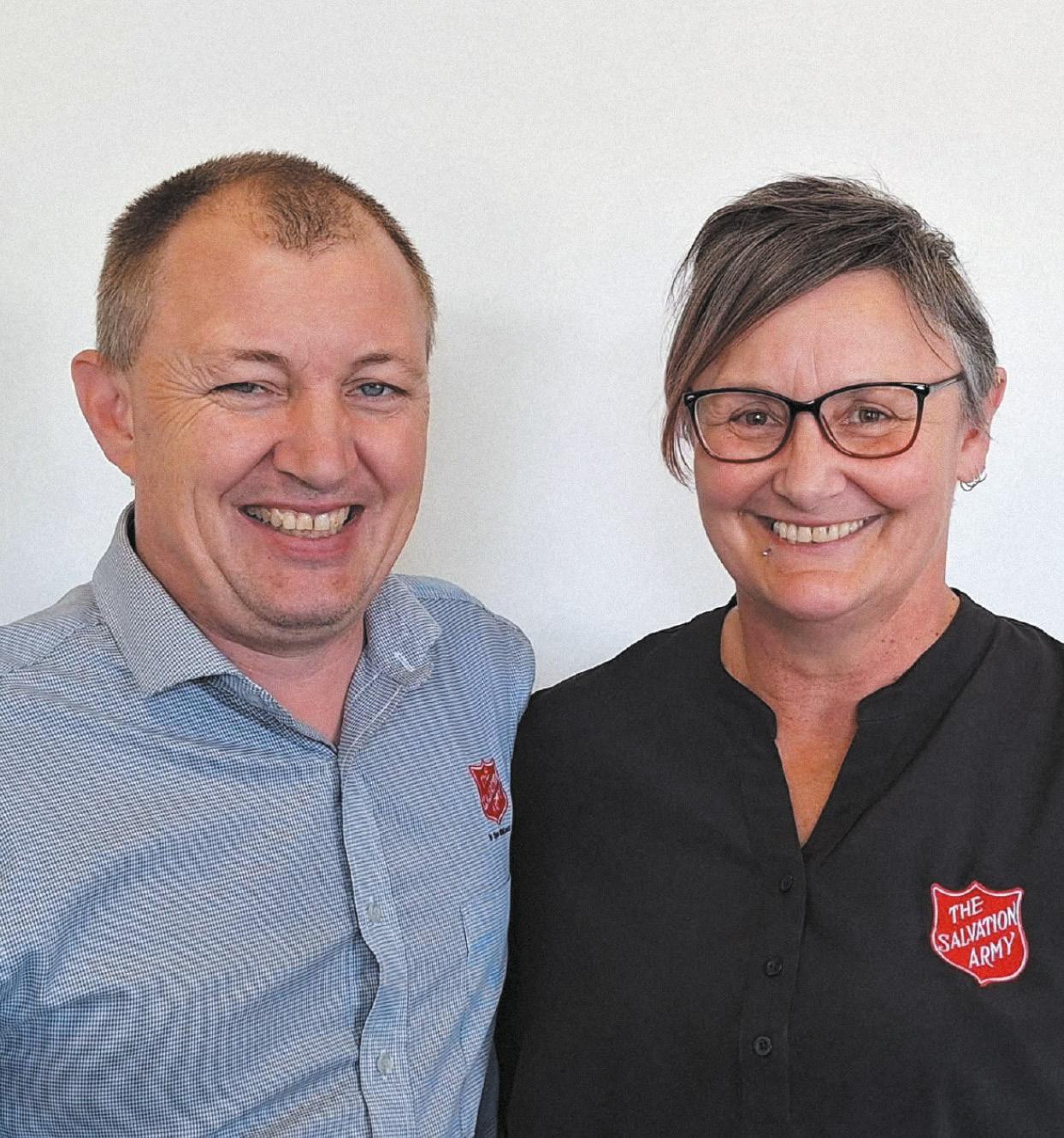
Friday in Belfast
Years before, when Andrew was about eight years old, he had attended Sunday school for a while.
‘Mum shipped my brothers and I off to this crazy Sunday school—there were about 100 kids there. It was run by a soldier from St Albans Salvation Army, and that Sunday school was the church plant that became Belfast Corps.’
Later, during his years as a paperboy, Andrew met a couple who would give him orange juice and a biscuit if he brought the paper to the door.
‘Gwen and Bob just loved me. I knew they went to church because of the stuff on the walls, but they never preached to me. After Bob died and I was going through all the stuff that was ruining my life, I would drop in to see Gwen. She was a safe space for me. When I turned up asking her if she would take me to church, she nearly died of shock! It just so happened that she went to the Belfast Corps.’
Within two years, Andrew was a follower of Jesus and knee-deep in youth work.
‘I was loving life—like, this whole Christian thing was cool! For the first time in my adult life, I didn’t feel like I needed a relationship to validate me. So I said, “Okay God, there’s all this cool stuff for us to do together, so
‘I was loving life—like this whole Christian thing was cool! For the first time in my adult life, I didn’t feel like I needed a relationship to validate me.’
if I’m meant to meet someone it must be by Friday, otherwise, I’m shutting the door to all that and getting on with it.” It was a naïve and weird thing to pray! Little did I know, Kim was praying the exact same thing! Her daughter was coming to youth group, so we met that Friday in Belfast.’
Within five months, Andrew and Kim were married. Kim brought three beautiful girls to the relationship— Kayla, Crystal and Ruby—and a few years later, their son, Jesse, was born. It wasn’t long before the idea of officership was put before the couple.
I am with you
‘I just wanted to do whatever God wanted,’ says Andrew. ‘So I was totally open to it.’
Andrew and Kim spent two years at Booth College of Mission, training to become Salvation Army officers. Their first appointment was at Foxton Corps, where they served for two fulfilling years. A new appointment saw the family move to Whanganui. It was a very challenging season and while they saw God do some incredible things, five years later Andrew and Kim were burnt out and their marriage was in trouble. Andrew returned to Belfast alone.
‘God said to me, “Will you fight for her?” And I said, “Of course I’ll fight for her! But how do I do that?” God said, “I’ll show you.” And he did! It was amazing.’
God restored Andrew and Kim’s marriage and together they returned to church—The Salvation Army in Belfast! Within a few months, Andrew and Kim were
Above: Andrew and Kim McKerrow.
serving as assistants to the corps officers. Life was good. But then in 2013, tragedy struck.
‘It was one of the most devastating things you could ever imagine. It was such a shock. Ruby had this ticking time bomb inside her that we knew nothing about. She went to bed, slept, but didn’t wake up again.’
After everything he’d been through already, Andrew still shakes his head in awe when he says, ‘In the middle of the pain, there was something of God that I experienced that I couldn’t have experienced any other way. Scripture talks about treasures of darkness, and now I know what that’s about. We had this deep sense of being held the whole time. God kept showing us that he was with us. God is different in that sort of pain. You can taste him and it’s nothing like when things are happy and rosy. I didn’t and wouldn’t sign up for it. It was devastating but sacred.’
‘God is different in that sort of pain. You can taste him and it’s nothing like when things are happy and rosy. I didn’t and wouldn’t sign up for it. It was devastating but sacred.’
Andrew testifies to the loving care provided by their Belfast Corps family, and to some important lessons about how to grieve in a healthy and helpful way.
‘We’ve learnt that our grief is best when we live with Ruby as well as without her. We keep telling stories about her and laughing about the things she would have done. We own our grief because it is so very important for us as a family to carry Ruby with us.’
Never alone
Andrew went on to train as a chaplain, serving and caring for those connected with the racing industry in
Aotearoa New Zealand for many years, and now helps train other chaplains within The Salvation Army.
In 2024, Andrew and Kim were asked to consider becoming the corps officers at their beloved Belfast Corps, now known as Christchurch North Corps.
‘It’s been the craziest, coolest thing ever! But the contrast between my two officership journeys couldn’t be more different—to the point that it is not even the same thing. I’m different, so it’s all different! I have a great spiritual director and solid spiritual practices and Kim and I protect each other’s space and make sure we are vital in our relationship with God and each other. Life is shaped around family—we’re grandparents now too, which is awesome! But when you reconnect with God’s grace and understand that not only is God’s grace there, but it is yours—that changes everything! Life is not the same anymore. Are there still hard days? Of course! We’re still learning, but we’re never, ever alone.’
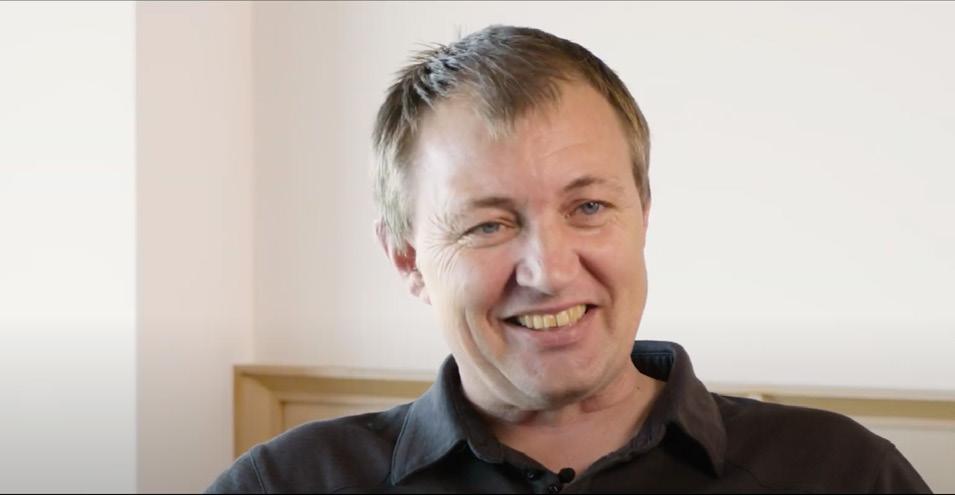
Check out this video from 2022, Making a Difference— Salvation Army Racetrack Chaplaincy, to hear Andrew share what it’s like being a Chaplain in the Race Track industry and why this role is so important.’
Watch it on The Salvation Army NZFTS YouTube channel: https://www.youtube.com/watch?v=y0-CFSL1M5M
Building Better Social Media Habits for Your Soul
Angel Barham, from The Salvation Army Johnsonville Corps, meets regularly with a group of young adult peers. Angel gets the lowdown on how these sincere Jesus followers navigate life on social media, offering not only some sound wisdom to ponder, but also plenty of practical advice to help keep your soul healthy while online.
We take care of so many areas of our lives: school, work, friendships and fitness. But how often do we think about caring for our social media life?
‘Social media hygiene’ might sound strange but think of it like this: just like you brush your teeth or clean your room, your digital habits need regular maintenance too.
Fifteen years ago, social media was simpler; it was just some status updates, photo albums and friend requests. Now? We carry these apps in our pockets 24/7. We scroll, swipe, like, comment, compare, consume
and sometimes, spiral. What we’ve learned over the years is that our social media habits affect our mental health, our relationships and our walk with God.
Is your feed feeding you?
Ask yourself: Are your social media habits helping or harming your faith? Are they building you up or quietly draining your peace, joy and attention? We asked some young adults how they practise social media hygiene. Here’s what they shared.
James: ‘You’ve got to understand how algorithms work. If you start liking
negative stuff, your whole feed shifts. Notice early and change course.’
Dan: ‘Not everything I follow is Christian, but it has to lift me up. It has to make me better, not weigh me down.’
Anthony: ‘I use an app that alerts me when I’ve spent over an hour on Instagram. It’s like a wake-up call. Then I switch to something more meaningful, like using Deepstash.’
Liam: ‘If you feel yourself slipping down a bad path online, get out quick. The devil will tempt you, so run to God sooner, not later.’
The scroll spiral
You open your phone for a quick laugh ... and 30 minutes later, you’re knee-deep in doom-scrolling. We’ve all been there. The Bible doesn’t mention TikTok or Instagram, but it does give advice on what we should let into our heads and hearts.
‘Finally, brothers and sisters, whatever is true, whatever is noble, whatever is right, whatever is pure, whatever is lovely, whatever is admirable, if anything is excellent or praiseworthy, think about such things.’ Philippians 4:8.
What if this verse became your social media filter? Before watching, liking or posting something, ask:
• Is this true or just clickbait?
• Is it pure or feeding temptation?
• Is it lovely or mean-spirited?
• Is it admirable or attention-seeking?
This isn’t about being perfect. It’s about protecting your peace. God created us to live full, connected, joyful lives. But if our focus is always on our feeds, we can slowly disconnect from what really matters.
Mental health matters
Too much social media is linked with anxiety, loneliness, poor sleep and comparison burnout. Even a 24hour detox can reset your heart and mind. You don’t need to delete your accounts to follow Jesus, but you do need to be aware of what your feed is feeding you.
Your relationships matter
Being present means putting your phone down when you’re with people. Ever hung out with someone who’s ‘half-there’ because they’re scrolling? Don’t be that person. Social media hygiene is relational, too.
Your faith matters
Sometimes we say we don’t hear from God, but maybe we’re just too distracted. Try turning off notifications and sitting in the quiet with him. It might feel awkward at first. That’s okay. The point is connection.
Staying accountable
You’re not meant to do this alone. Just like we talk about fitness or eating habits with friends, we can talk about social media habits too. Ask each other:
• What’s one account you could unfollow this week?
• Have you ever tried a social media Sabbath?
• What content actually helps you feel closer to God?
After talking to countless youth and young adults, we’ve learned that this isn’t just your struggle, it’s our struggle. Social media is designed to grab our attention, keep us comparing and leave us craving more. Even the most grounded believers wrestle with screen time, endless scrolling and feeling spiritually drained online. You’re not weak for finding it hard to unplug. You’re human.
Helpful apps for a healthier social media life
One simple way to create better social media habits is to replace some of your scrolling time with apps and content that feed your soul instead of draining it. Here are some helpful tools that young adults have found meaningful as they work toward a more Christ-centred digital life.
• YouVersion Bible App: This widely used app offers a range of Bible translations, audio Bible options, daily reading plans and verse reminders.
• Lectio 365: A guided devotional app that helps you reflect on Scripture and pray in a thoughtful, focused way.
• Faith-based podcasts: If you’re looking for audio content to replace mindless scrolling, try these podcasts that blend spiritual depth with everyday relevance.
• BibleProject: Exploring the big story of Scripture through visuals and deep theology.
• Bridgetown Audio: Teachings from a church that blends modern life with ancient faith.
• Christ with Coffee on Ice: A relatable, encouraging podcast for young adults navigating life and faith.
• Whoa That’s Good: Sadie Robertson Huff hosts uplifting conversations about faith, purpose and the advice that changed her guests’ lives.
Try swapping 10 minutes of scrolling for one of these and see how you feel afterwards.
Final thought: do a social media clean-up
This week, take five minutes and do a screen audit. Look through who you’re following and check your screen time stats. You’ll quickly see where your time and attention are going.
God’s not asking you to be perfect on social media. He’s inviting you to be present. Because he cares about your whole life, even the part lived through a screen.
Fear of Failure?
I always find the first sentence of a sermon, an email, or an article the hardest to write. Sometimes, not knowing where to start prevents me from beginning at all.
As I write this column, I am at the Magnificat Retreat Centre in the Wairarapa. It’s a beautiful place to be on retreat—a wonderful place to switch off from the busyness of life and connect with God.
Magnificat is located at the base of the Remutaka Rail Trail— a trail that takes you from just outside Featherston to Kaitoke. Many people who have been on retreat at Magnificat have climbed the 7 km incline to the Remutaka Summit and back again. Up until this week, I had not been one of them.
You may or may not be familiar with the personal development tool, StrengthsFinder. One of my strengths is ‘Achiever’. This means I like to complete tasks—hence my love of lists. Generally, if I start something, I will see it through. However, this also means that at times I hesitate to start a task for fear of not completing it—for fear of failing.
Yesterday, as I contemplated walking the Remutaka Rail Trail, I really wanted to do it. I wanted to tick it off my ‘to-do’ list, yet I was worried that I wouldn’t make it. You see, I don’t do a lot of long walks and I especially don’t do hills. But I did want to see what the view was like, and I did want to be able to say that I had completed the walk.
My fear of failing almost prevented me from giving it a go.
In the Bible, there are over 300 instances where followers of God are told, ‘Do not be afraid’ or ‘Fear not’. We are invited to trust God in all things—the big, the little and everything in between. Trusting God does not mean that our path will always be easy. Starting my 14 km walk was only the beginning. There were times when I wondered how much further I had to go, when I wanted to give up—but two lines from a song kept playing in my mind: ‘Step by step you’ll lead me … I will ever praise you! ’
Over the retreat, Psalm 27:1–5 was used a couple of times, especially verse 4, which speaks of dwelling with God and gazing on his beauty. Yet all around this verse, the psalmist reminds us that life is tough. There are things that frighten us and prevent us from doing the right thing. Yet it says, ‘my heart will not fear ’.
Whatever you might be facing today, if the fear of failure is stopping you from starting something new, remember that God is with you—always.
Lt-Colonel Liz Gainsford Territorial Secretary for Spiritual Life Development
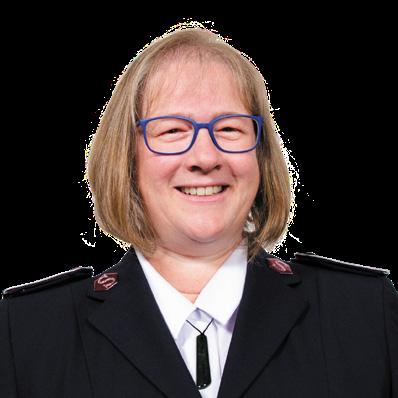
Psalm 27:3–4
Though an army besiege me, my heart will not fear; though war break out against me, even then I will be confident. One thing I ask from the Lord, this only do I seek: that I may dwell in the house of the Lord all the days of my life, to gaze on the beauty of the Lord and to seek him in his temple. (NIV)
Ahakoa whakapae noa te ope i ahau e kore tōku ngākau e wehi; ahakoa ara noa te pakanga ki ahau, ka au tonu ia ahau. Kotahi tāku mea i īnoi ai i a Ihowā, ko tāku tēnā e rapu ai: kia noho i te whare o Ihowā i ngā rā katoa e ora ai ahau, kia kite ai i te ātaahua o Ihowā, kia ui ai i roto i tōna temepara. (PT)
Kevaka sara mada ga e wavoliti au e dua na mataivalu taucoko, au na sega ga ni rere; Kevaka sara mada ga era ravuti au na meca, au na vakadinata tikonga na Kalou. Au a kerea vei Jiova e dua na ka: Me’u tiko ga ena vale i Jiova Ka qoroya na nona vinaka, Ka me’u dau taroga na nona i vakasala mai kea. (FOV)
Neongo ‘e nofo‘i mai ha kongakau, Ko hoku loto ‘e ‘ikai manavahe: Negongo ‘e tu‘u kiate au ‘a e tau, Na‘a mo ia te u falala pe. Kuo u kole meia Sihova ha me‘a pe taha, Ko ia pe te u kumi ki ai: Ke u nofo ‘i he fale ‘o Sihova ‘I he ‘aho kotoa o ‘eku mo‘ui, Ke siofi ‘a e faka‘ofo‘ofa ‘o e ‘Eiki, Mo fakalaulauloto ‘i hono palasi. (TWB)
E ui lava ina to lauapi se itu taua e tau ma a‘u, e le fefe ai lo‘u loto; e ui ina sittia se taua ia te au, ou te loto tele lava i lea mea. E tasi le mea ua ou ole atu ai i le Alii, o le mea lava lea ou te saili atu ai; ia ou nofo i le fale o le Alii i aso uma o lo’u ola, ina ia ou iloa atu ai le matagofie o le Alii, ma ou saili i lona malumalu. (SOV)
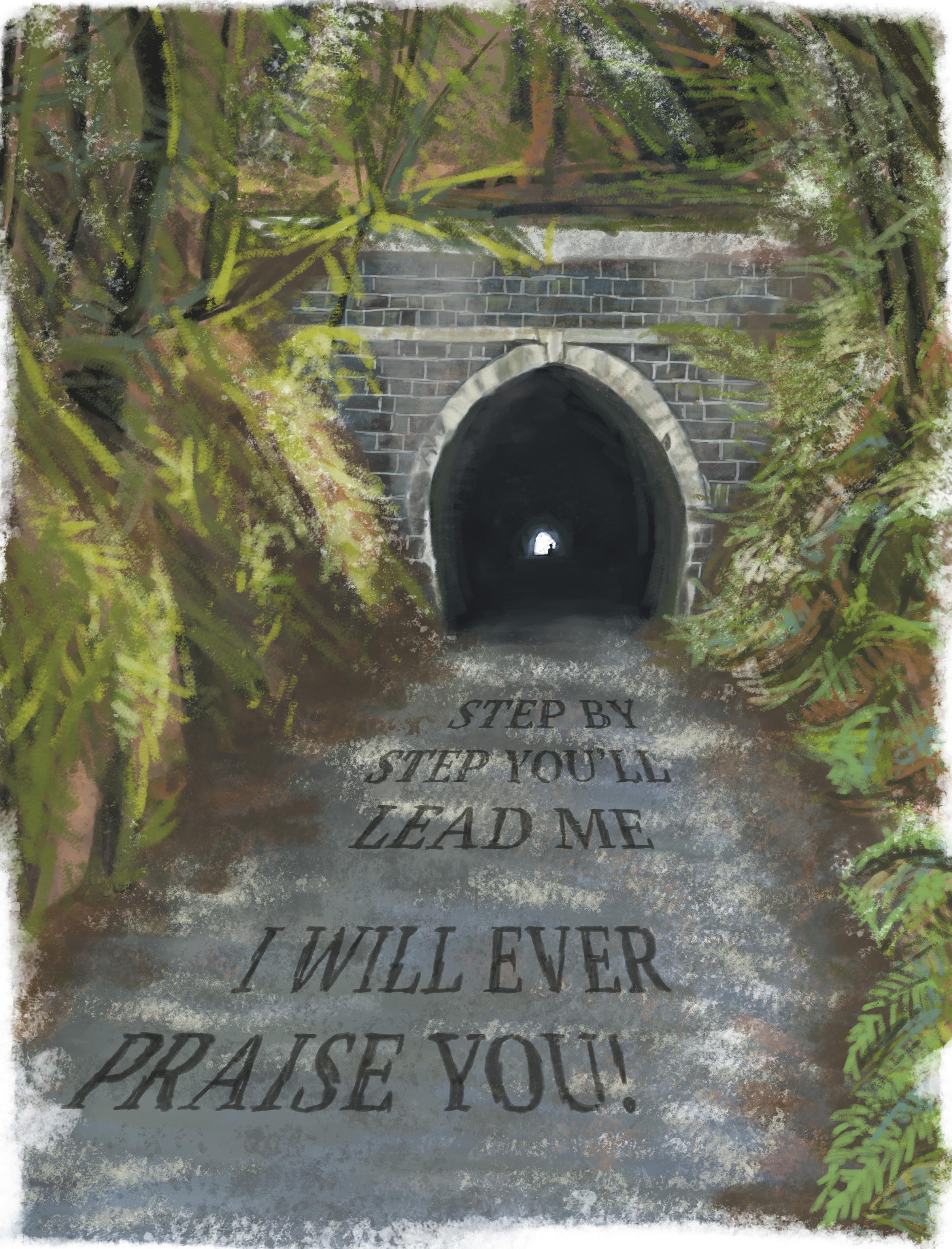

Early Childhood Education Reimagined
The Salvation Army offers quality Christian early childhood education across four centres in Aotearoa New Zealand. Kelly Cooper sat down with Helen Stolten, National Early Childhood Education (ECE) manager for The Salvation Army, to share the transformational impact these centres are having not only on the lives of children, but also on their wider families and communities.
Early childhood is widely recognised as a crucial stage in a child’s development. With so many early childhood education (ECE) centres available, The Salvation Army offers a distinctive approach to learning in the early years.
‘Our real point of difference is that in addition to high-quality early childhood education, we also offer wraparound services for families in ways that most ECE services just cannot,’ explains Helen. ‘We are able to provide support and care from our centre, our connections with local corps (churches) and other areas of Community Ministries.
‘We also offer a smaller service than most other centres and because of this we can build long-term relationships with children and their families. Mount Wellington, Auckland is our biggest centre with a roll of 45 children. This includes up to 10 babies and up to 35 children under two years.’
A holistic approach
One family that has been deeply impacted by this holistic approach is the Taylor* family. Their son Simon* came into the care of the Mount Wellington centre when he was two years old. ‘When we first met Simon,
he had very high needs and was non-verbal,’ explains Helen. ‘We worked with him one-on-one for the first six months. He had essentially been bounced around different centres before he came to us.
‘Early on, we recognised some differences in how Simon experienced the world. We collaborated with his family to build their understanding of neurodiversity and offered support over the following year as we moved together toward a paediatric assessment, which formally diagnosed Simon with autism.’
The centre also sought assistance from a speech-language therapist and early intervention specialists, who worked closely with Simon, his family and teachers. In addition to this, centre staff further supported the family to strengthen their home life.
‘Over a three-year period, Simon went from being completely nonverbal to arriving at his graduation day at Mount Wellington announcing, “I am five! I am five!” He was beaming,’ shares Helen. ‘His mum has recently expressed to me how mind boggling it is to see her son in his school uniform ready to transition to primary school.’
Community impact
Along with the Mount Wellington centre, The Salvation Army operates three other ECE centres, including Newtown Early Childhood Education Centre in Wellington, William Booth Educare in Upper Hutt and Kidz Matter 2 Us in Waitakere.
‘We have families that choose us because we’re a Christian centre and we also have families who are desperate and have nowhere else to go,’ explains Helen. ‘We don’t ever
want there to be any barriers for children attending our centres and we work with families to come to an agreement on a co-contribution to our centre fees. Our work would not be possible without the sponsorship element we receive from The Salvation Army Supporter Engagement and Fundraising team.’
‘We don’t ever want there to be any barriers for children attending our centres...’
‘Donations enable us to provide the very best for our children. One family shared with us that they could either pay for their groceries or their fees for the week and we said, “How about we take care of both?”
I’ve worked in the private ECE sector for 15 years and I’ve never been in
a position to be able to provide for children and their families in this way. It’s something quite special,’ reflects Helen.
Safe spaces
While all teachers care for all children, every child has a key teacher who builds a more intimate relationship with the child and their family. Families are encouraged to share what is going on for them with this teacher, allowing centre staff to offer support when needed. This might include counselling, prayer, food parcels, budgeting services or opportunities to attend Positive Lifestyle Programmes. Each centre also has a chaplain, giving families another point of connection.
Helen notes that some of the children in their care face significant hardships, and she recognises that their centres often become a place of safety and security. ‘We can be the consistent presence in the midst
…their centres often become a place of safety and security.
of very chaotic circumstances for our children and their families,’ she says.
‘When you work with someone over a two- or three-year period it is longterm, life-changing stuff,’ reflects Helen. ‘For us, the impact we have on the children in our care, and their entire family, is lasting. When we think of evangelism, we often picture people coming to church. But in our centres, people who may never step into a church are being ministered to in a deeply meaningful way. When I consider how many hours a child spends gathered around our table or sitting in circle time with prayer over the course of a year—if that’s not church, I don’t know what is.’
*Names
have been changed for anonymity

A Resilient Spirit
Gaylene Harawira , corps sergeant major at Whakatāne Corps, shares her story of resilience and hope, as she continues to uplift others with positivity and a steadfast belief that God walks with her every step of the way.
I don’t remember when I first knew God, but I have always sensed his presence with me. I grew up in Whakatāne and was the eighth of 15 children. We lived in a three-bedroom house, although we weren’t all at home together as some of my older sisters had already left. I come from a loving family, and we have remained very close-knit. Mum and Dad brought us up this way. We always had a family lunch once a month and celebrated Christmas together with a big hāngī. We grew up with kapa haka and lots of singing.
My father belonged to the Rātana Church, and my mother belonged to the Ringatū Church. They always supported each other. There wasn’t a Rātana church in Whakatāne so we would travel to Whanganui a few times a year to attend.
When I was young, my mum would also send us to The Salvation Army on Sundays with a friend. Mum gave us money to put in the collection plate ‘to give to Jesus’ and some money to buy an ice cream or chips on the way home. I remember learning that you are not meant to take change from the collection plate.
My mother was not happy when she found out I had tried to do that!
Reconnection
Many years later, I reconnected with The Salvation Army through my husband. He was a recovering alcoholic and had come to The Salvation Army for some help. He kept saying to me, ‘Come to church with me,’ and I would say, ‘No, no, it’s okay. I already know who God is. I don’t need to come to your building to see who God is.’
My husband was still drinking, but for a while I saw a change in him. Eventually, I started coming along on Sunday mornings with our four children. Sadly, my
husband fell off the wagon, we parted ways and I became a single mother. I loved spending time at The Salvation Army in Whakatāne and was the Family Store manager for several years. My children grew up in The Salvation Army because I wanted them to have a strong foundation of knowing God. Not all of them attend the Army now, but they all know who God is and the importance of karakia (prayer).
I’ve been with the Army in Whakatāne for nearly 38 years and I became a soldier in 2000. People sometimes ask me why I choose to wear the uniform. I wear it because it helps me in my walk with God. I wanted to become transparent and for people to know that I am a follower of God. For a long time, I wasn’t active in my faith, I was a bum on a pew. But then I developed a personal relationship with Jesus, and I knew he was real.
I developed a personal relationship with Jesus, and I knew he was real.
Testing times
In 2021, my faith was tested when I was diagnosed with breast cancer. I was devastated. I had so many questions, especially, What is going to happen to my children and mokopuna if I die? I have 15 grandchildren, and some of them are in my care. But the whole experience was amazing. Every single thing fell into place with my appointments and treatment. I had chemo every week for a whole year, and it was brutal. I started to lose the nerves in my fingers and toes. I still cannot do up my own buttons.
The chemo worked and I dropped to having it every two weeks and then immunotherapy every three weeks. I was well and then boom! A new cancer formed this year in the same breast. I never questioned God, but I did wonder what was going on. I know that if I didn’t have my relationship with God that I would not have survived. Instead, it was like a veil was lifted from my eyes. I saw beauty everywhere. I have remained positive throughout all my treatment, and I encourage other people to be positive too. I say, ‘Look at your children, look at everything around you, look at creation.’ I wasn’t always like this. I know this is God walking with me.
I just love that Jesus chose me.
Passion for people
I just love that Jesus chose me. He chose me specially, I really believe this. He plucked me out of a crowd and placed me here for a reason. I am here to help the people I work with in Community Ministries. I work in the foodbank, I greet people at the front door, help with playgroup, and I visit our nannies and koru (older people) in local rest homes. I was appointed as the Whakatāne Corps (church) sergeant major earlier this year. I’m 65 years old and they could choose a young person for my role, but I’m still here. I love my job and I love helping this community.
I’m currently undergoing immunotherapy, and I’ve had a full mastectomy. I was sent to Tauranga Hospital for my surgery and was in hospital for eight days. The staff were incredible. They were amazed that I was sitting up after the third day and my wounds were healed up on the sixth day. They looked at me and said, ‘You are amazing,’ and I said, ‘It’s not me, it’s God!’ I still have some tough days, but I have a loving family and the fantastic staff I work with here at Whakatāne Corps.
I love my job and I love helping this community.
I truly believe in [co-founders] Catherine and William Booth’s mission. If we stick to the programme we won’t get anything wrong. We need to be asking the questions: Why are we here? and Why did Catherine and William create this Army? It was always to help people. It is my hope for everyone to know Jesus the way I know him. He’s my everything.
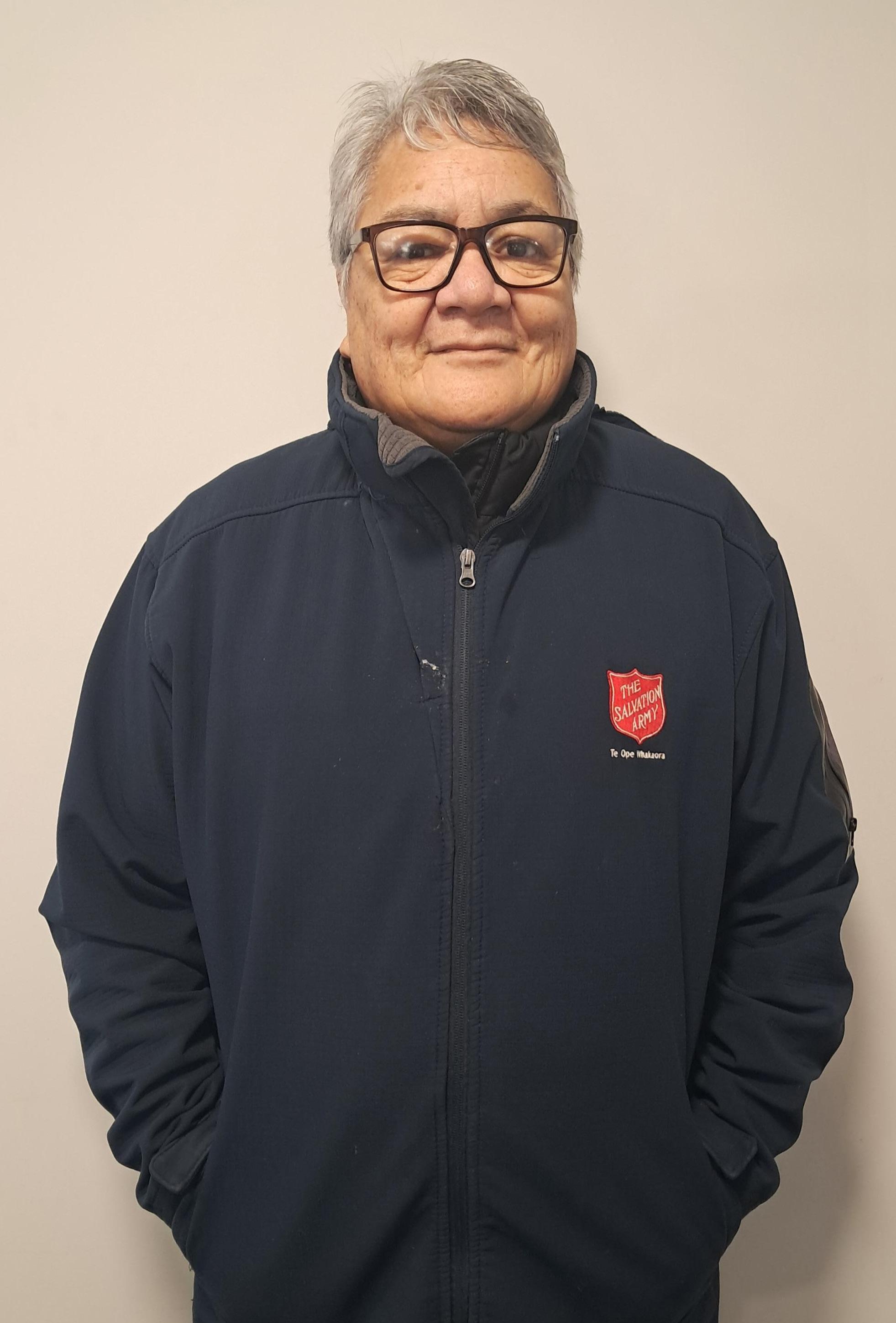
Demanding Attention; Actioning Hope
This year, The Salvation Army is excited to recognise the 21st anniversary of its Social Policy and Parliamentary Unit (SPPU). The Unit’s goal is ‘to work towards the eradication of poverty by encouraging policies and practices that strengthen the social framework of New Zealand’. To celebrate this milestone in the policy work of the Army, past and present members of the team have taken time to reflect on why SPPU is as vital now as it was in 2004.
WORDS Holly Morton-Chong
ver the years, the Social Policy and Parliamentary Unit (SPPU) has advocated and spoken out on a wide range of social concerns on behalf of The Salvation Army. SPPU’s advocacy has focused on five key areas of concern: children and youth, work and incomes, housing, crime and punishment, and social hazards. Māori wellbeing in New Zealand is also something that the SPPU measures in relation to all five of these areas.
The work of the SPPU sits directly alongside the frontline mission of corps and Community Ministries and could be described as calling for ‘a fence at the top of the cliff’ and advocating for policy changes that can minimise the social dangers that people in the community face. Lt-Colonel Ian Hutson, mission officer for SPPU, explains that ‘Poor social policy can lead to the kind of poverty and homelessness that many of our Salvation Army services seek to respond to. Advocating for good social policy is a key part of preventing that.’
Ian describes the territorial benefit of the SPPU as: ‘...SPPU carries this [work] for The Salvation Army but also seeks to support and inspire many people who work within the Army to be social justice advocates
in the communities where they live. SPPU, being embedded in the organisation, has the unique and precious opportunity to understand what is happening at the coalface and to advocate for real change.’ Many of the reports and other publications released by SPPU make a clear connection to the significance of The Salvation Army’s Christian faith and its history, and this informs and guides their work.
For the least of these
SPPU’s goal of the eradication of poverty in Aotearoa New Zealand reflects all parts of the territory’s Mission Statement—caring for people, transforming lives, and reforming society by God’s power—by imagining
‘SPPU, being embedded in the organisation, has the unique and precious opportunity to understand what is happening at the coalface and to advocate for real change.’
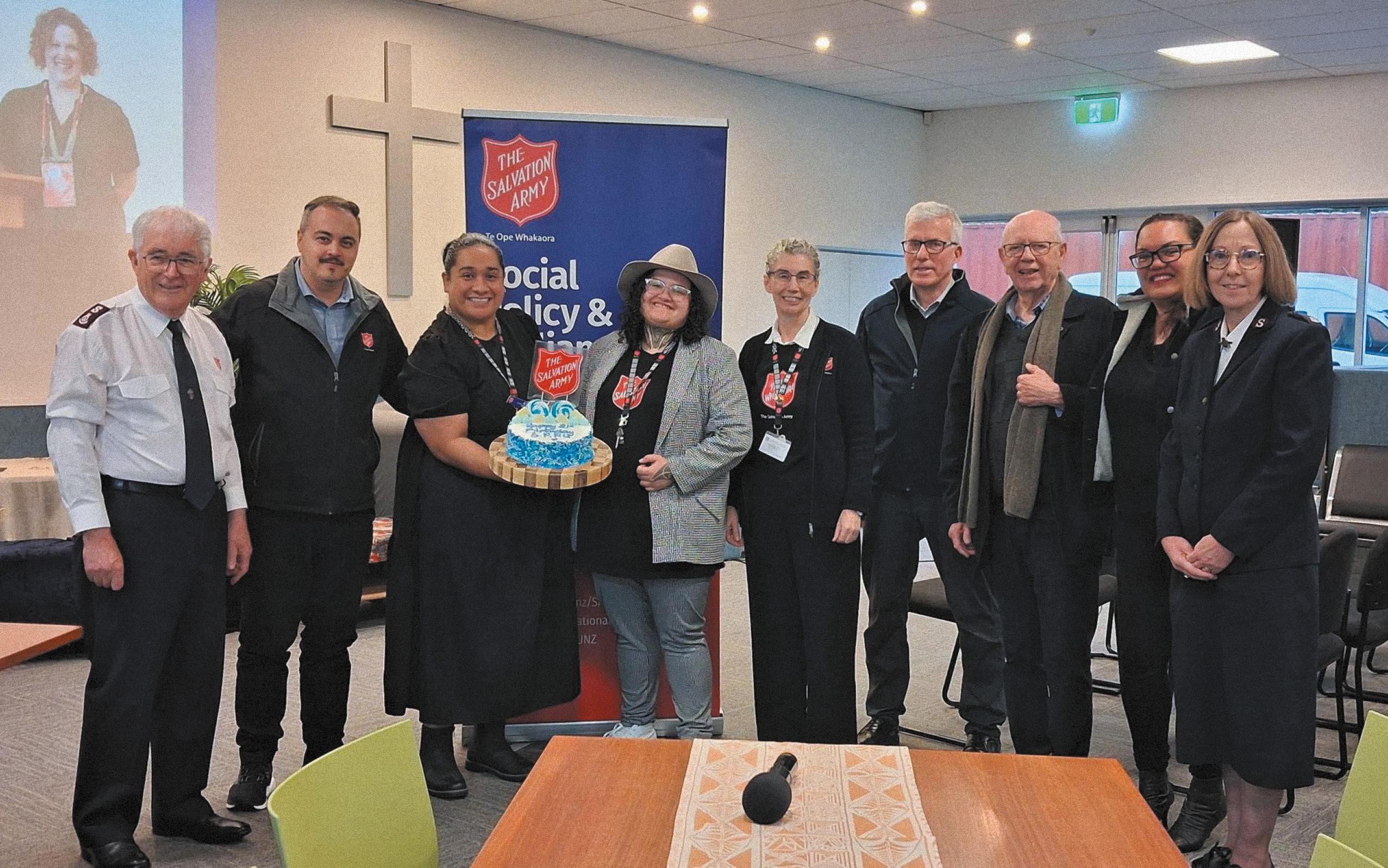
and moving towards a better future that reflects the kingdom of God. They understand that poverty, and the lack of opportunities that come with it, have flowon effects for many—if not all—of the social concerns that their work is connected to.
When considering this connection and the theological foundation of SPPU, many of the team referenced Jesus’ words in Matthew 25:35–40: ‘For I was hungry and you gave me something to eat, I was thirsty and you gave me something to drink, I was a stranger and you invited me in, I needed clothes and you clothed me, I was sick and you looked after me, I was in prison and you came to visit me … Truly I tell you, whatever you did for one of the least of these brothers and sisters of mine, you did for me.’ SPPU extends this by asking, ‘Why are they hungry? Why don’t they have clothes? Why are they in prison?’—and then bringing those findings to policymakers in the hope of enacting change.
Belief into action
Many of the ongoing social areas of concern for SPPU are similar to issues Salvation Army co-founders
William and Catherine Booth dealt with during their time, including alcohol and drug addictions, housing insecurity and unemployment. William Booth was sure that people’s physical needs must be attended to in order for them to have any space to consider faith in Jesus, as described in Cyril Bradwell’s book Fight the Good Fight: ‘…the appalling temporal circumstances of a vast number of people made their salvation most unlikely, unless regard was also paid to their material needs’.
This belief had practical outworkings both in England and later in Aotearoa New Zealand, as The Salvation Army arrived to serve in this country. In England, The Salvation Army responded to a major issue of the era, when female workers making matches for fires developed phosphorus poisoning, or ‘phossy jaw’, at the match factories. To counter this, the Army developed the ‘Light in Darkest England’ matches as an alternative to the matches being sold. The Salvation Army’s concern for factory workers and their unsafe working conditions contributed to the government’s
Above (from left): Major Campbell Roberts, Antonio Ferreria de Lima, Ana Ika, Charm Kataraina Skinner, Rev Dr Bonnie Robinson, Paul Barber, Major Ian Kilgour, Reina Tuai Penney and Major Sue Hay at the SPPU 21 years celebration in Manukau.
Many of the ongoing social areas of concern for SPPU are similar to issues Salvation Army co-founders William and Catherine Booth dealt with during their time, including alcohol and drug addictions, housing insecurity and unemployment.
eventual outlawing of the production of phosphorus matches in 1910 due to health concerns. Without that change in legislation, The Salvation Army in England might still be seeing the poor generational health outcomes of phosphorus-filled factories in the people they support in 2025.
In Aotearoa New Zealand, the SPPU was formed to combat these social concerns, working behind the scenes to effect change in law and policy, in the hope that issues like poverty, unemployment and a lack of housing could be resolved for the whole nation.
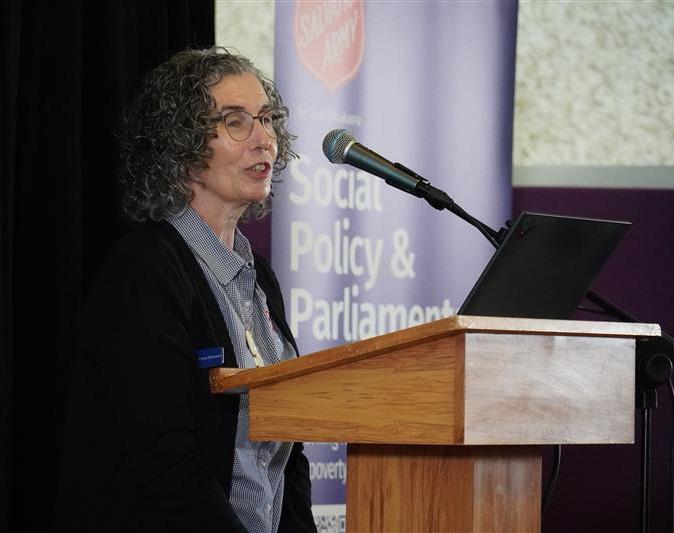
The work begins
SPPU commenced in 2004 and was led by Major Campbell Roberts. The current SPPU Director, Rev Dr Bonnie Robinson, was also involved in the early development of SPPU and wrote their first report, A New Zealand that Demands Attention. On reflection, she says that there was some difficulty in discerning what to focus their energy on: ‘When the Unit began, we had a clear overarching goal of wanting to eradicate poverty in Aotearoa. How we would do that—the contribution that SPPU would make—was much less clear. With so many intersecting issues contributing to poverty in this country, we wondered where to begin, what to focus on to be effective and have a chance at achieving real change.’
This first report served as an agenda-setting document for SPPU and the social issues they hoped to address and influence. At the time, these included some themes that remain priorities in 2025: housing, unemployment, criminal justice and addictions. There were also some more specific concerns—care of the elderly, parenting and people struggling with mental health. Since that inaugural report, SPPU has produced numerous reports on a wide range of issues, including 18 State of the Nation reports, six State of our Communities reports and almost 200 submissions to government. The consistency of certain reports, like State of the Nation, has set SPPU up as a trusted source of data tracking on these issues, and these reports are often picked up by other NGOs and community groups to inform their own campaigns.
Acting together for good
In seeking a better future for Aotearoa New Zealand, SPPU has written reports and submitted on many issues relating to the wellbeing of children and youth, including in favour of the Minors (Court Consent to Relationships) Legislation Bill in 2017. SPPU’s submission on this Bill, which sought to require approval from a Family Court judge for a young person under 18 to be married (instead of consent from their parent or guardian), included statistics from Shakti Community Council Inc. on forced marriages in Aotearoa New Zealand, and queried what further support should
Above: Rev Dr Bonnie Robinson, SPPU director.
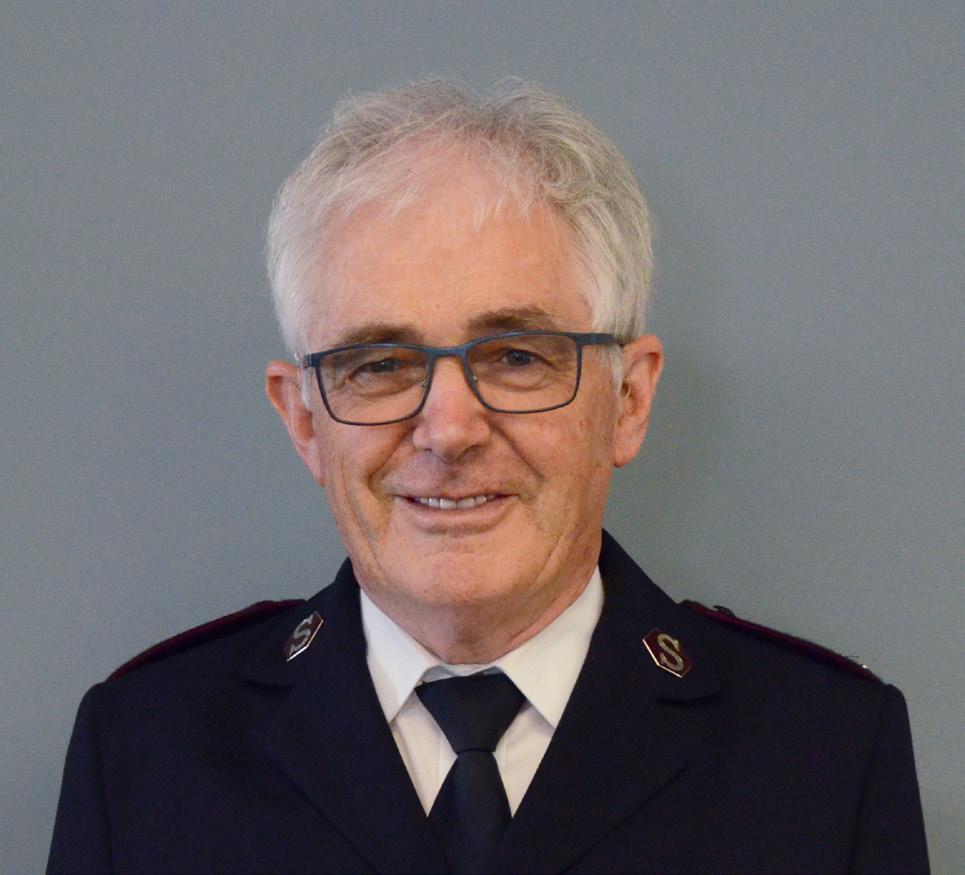
be put in place for vulnerable young people brought into forced marriages. Their submission stated: ‘The Salvation Army believes that one forced marriage is one too many. It is another form of violence and exploitation, particularly for women and young people in vulnerable contexts who may be otherwise isolated from wider society.’ The Bill was passed in 2018, because of considered submissions like SPPU’s.
One of the more recent policy wins for the SPPU has been around the regulation of the sale of alcohol in vulnerable communities. They became more involved with this in 2020, after Captain Jocelyn Smith successfully objected to the opening of a bottle shop in her community in Christchurch. Sharing in the learnings from that experience, SPPU collaborated with Communities Against Alcohol Harm to develop an Alcohol Advocacy Toolkit to guide communities through the process of objecting to bottle stores opening near them. Social Policy Analyst Ana Ika has spearheaded this work for SPPU and explains that the toolkit is, ‘grounded in harm minimisation, not just aiming to get licences declined, but to secure conditions that reduce harm when licences were granted. We began actively objecting to licence applications, together with our frontline staff, learning as we went. Our staff supported or led objections
across the country—in Auckland, Hamilton, Tokoroa, Palmerston North, Porirua, Christchurch, Timaru, Oamaru and more.’
Ana has also written several reports and submissions to government around alcohol regulation, including Uncapping the Voices of Communities: Looking closer at local alcohol policy and district licensing committees in Aotearoa New Zealand in 2022, which contributed to the passing of the Sale and Supply of Alcohol (Harm Minimisation) Amendment Bill.
What now?
There is a benefit to reaching a milestone like 21 years of work for SPPU, for reflection on work achieved and work to be done. Bonnie notes, ‘As SPPU celebrates the past 21 years, we also look ahead. Our big, hairy, audacious goal is to eradicate poverty in New Zealand. Our hope and prayer are that in another 21 years we won’t be needed—or not as much—because Aotearoa will come together to develop and implement the policies, systems and structures that create a society where poverty has indeed been eradicated.’
Dr Martin Luther King Jr reminded us, ‘The arc of the moral universe is long, but it bends towards justice’, which SPPU Principal Policy Analyst Paul Barber sees as the work of SPPU: ‘The positive changes achieved serve as beacons of hope, demonstrating that with persistent advocacy and a commitment to equity, we can bend the arc.’
In all SPPU’s reporting—graphs, statistics and trends— they really seem to work in the business of actioning audacious hope: hope that New Zealand has the tools to eradicate poverty, and that as a nation we can do the hard but worthwhile work of ‘fostering a society that embodies compassion, justice and love for one another’. Which is the business of The Salvation Army as well.
To read a collection of writings that reflect on the work of SPPU in the past 21 years, visit salvationarmy.org.nz/SPPU21
Above: Major Campbell Roberts, the first leader of SPPU.
The Art of Letting Go
WORDS Jules Badger
There’s something sacred about winter. The days are shorter and wilder, and we are drawn inside to take shelter from the elements. Referred to in many cultures as ‘the resting season’, winter invites us to slow down. Like a bulb buried deep in the soil waiting for spring, winter grounds us again after all the activity of longer, fuller days. God offers the gift of winter to help us reflect and reorientate ourselves once again around what matters most—what’s real.
Lately, I’ve struggled to shake the sensation of being caught between what’s real and what’s mere illusion, so I’ve started ‘letting go’ by turning things off. Like lights (it’s candle season) and of course the various screens that dominate my life in the 21st century. Instead, I’ve been listening to music, and not while doing something else, but for the joy of the art form itself. And reading—for pure pleasure while snuggled up with the dog under a blanket. It feels like a reclamation of something lost; a quiet revolution of the soul!
With the caveat ‘forgive me for the hypocrisy of posting this online’, Lutheran pastor and writer Nadia Bolz-Weber offers a ‘prayer for trying to stay off the internet more’. But really, it’s a prayer for letting go of what hinders the soul’s flourishing. She prays, ‘In your infinite mercy, guide me away from the virtual and into the actual, from feared tomorrows into this only now, from what I see on a screen to what I behold in my life, from what I am manipulated to desire to what I am content to have’.
Nadia concludes with, ‘Guide me to what is most real, because you know, O Lord, how unsuited my heart is for the artificial’.
Is there something God is inviting you to let go of this winter?
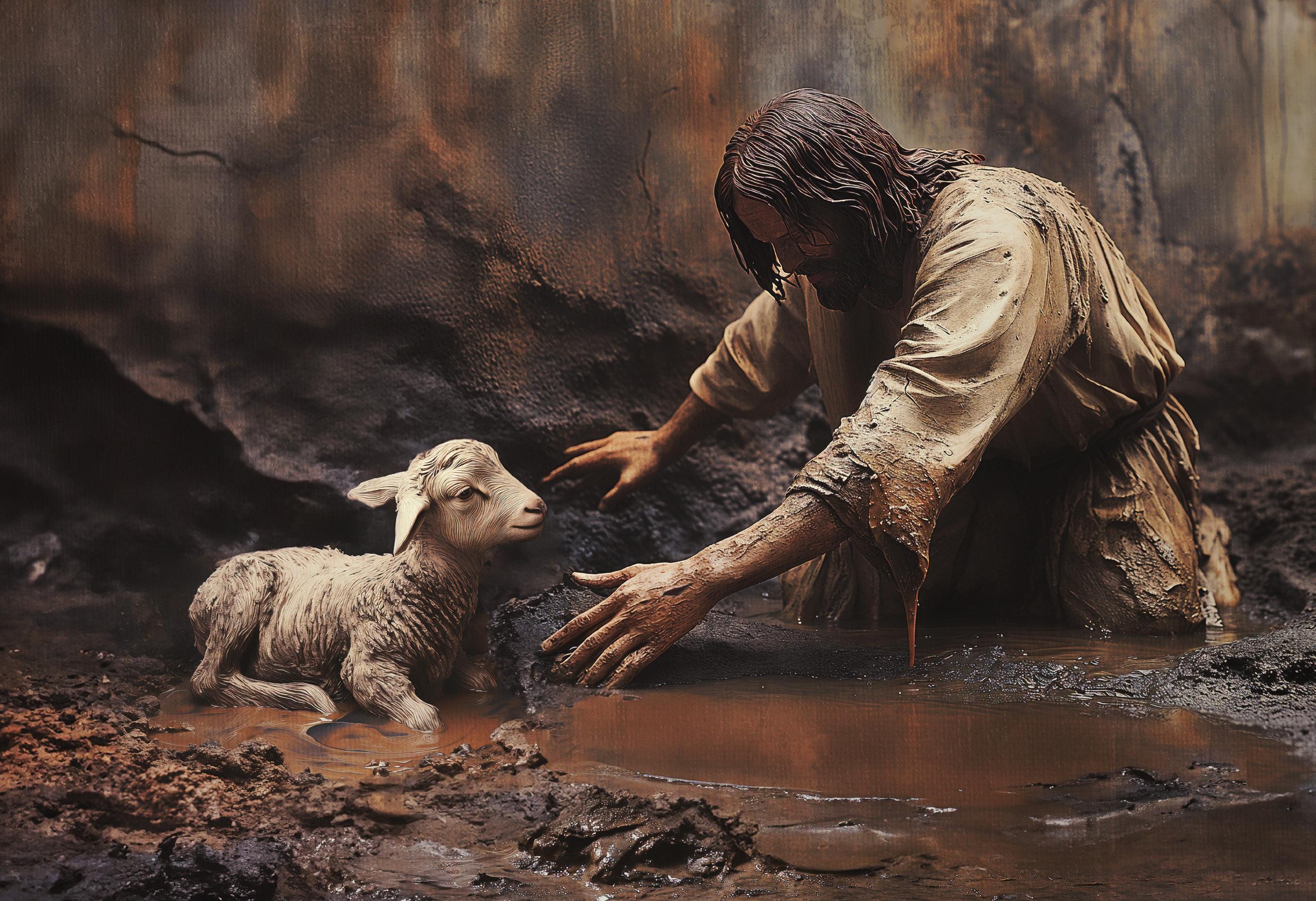
The Pursuit of God
In the final verses of Psalm 23, the psalmist’s assurance of a future spent with God comes to life as he declares his present trust in the shepherd. In the final part of this three-part series, Jules Badger reflects on God’s loving pursuit of us that endures all the way into eternity.
The title of this article is a play on words. ‘To pursue or be pursued?’
In these final verses of Psalm 23 the psalmist knows full well who began the pursuit and who sustains it.
In verse six in the New Living Translation (NLT) it says,
‘Surely your goodness and unfailing love will pursue me all the days of my life, and I will live in the house of the Lord forever.’
In his little book Safe in the Shepherd’s Arms, Max Lucado writes of verse six,
‘This must be one of the sweetest phrases ever penned. Lived experience of the shepherd’s care, protection and love assures the psalmist that he can trust the shepherd today, tomorrow and always. “Surely” in this context is not hope without substance, but a testimony!’
As I’ve spent time studying, reflecting and meditating on the beauty, truth and promises of Psalm 23, I’ve come to understand that God’s love for me has never failed and to this day his pursuit of me has never faltered—even
in all my wanderings and sin. Even my most earnest pursuit of God cannot compare with God’s relentless pursuit of me. And of you
Translations like the New International Version (NIV) and the New King James Version (NKJV) opt for ‘follow’ instead of ‘pursue’, but Emily Freeman, spiritual director, author and podcaster writes:
‘The psalmist, acknowledging death’s valley, wrote that goodness and mercy would follow
him all the days of his life. This does not imply a trailing behind kind of follow, like a toddler or a puppy. No, this following is a pursuit, a chase, a running after with the intent to catch up. Surely goodness and mercy shall run after me all the days of my life.’
Emily’s choice of phrase is powerful in both its simplicity and implication. Eugene Peterson, author of The Message (TM) interpretation of the Bible, selects a phrase that adds an even greater sense of urgency.
‘Your beauty and love chase after me every day of my life.’
I recently met a man who had travelled from further up the North Island down to Wellington to search for his teenage granddaughter, who was caught up in drugs and had run away from home. He was not a young man, but he was determined to find his beloved mokopuna (grandchild)— to chase her down and bring her home. Eventually he caught a glimpse of her profile across the street. She was alive! And her surprise at seeing him paled in comparison to his relief and delight in locating her. Like the shepherd of Psalm 23, motivated by unfailing love, he’d been relentless in his pursuit of her. That’s how God loves us! He pursues us all the days of our lives.
Max Lucado writes, ‘What a surprising way to describe a God who remains in one place. A God who sits enthroned in the heavens and rules and ordains. The psalmist, however, envisions a mobile and active God. Dare we envision a God who follows us, who pursues us, who chases us, who tracks us down and wins us over? Who follows us with “goodness and mercy” all the days of our lives?’
As I look back on my life I am able, like the psalmist, to thank God for his provision, for showing me how to rest, for leading me along the right path, for being with me through the valley of the shadow of death, for comforting and protecting me through trial and suffering, and for placing his favour on me and filling my life with abundant blessing. And because of God’s goodness and love in action in my life, I know that God will do what he says he will do because he’s proven himself faithful time and again.
...I know that God will do what he says he will do because he’s proven himself faithful time and again.
‘Surely your goodness and unfailing love will pursue me all the days of my life, and I will live in the house of the Lord forever.’
While Psalm 23 is perhaps the most well-known in Scripture, Emily says, ‘I think it’s safe to say that while many people know it by memory, they may not know it by heart’.
To know Psalm 23 by heart is to know the shepherd. Yes, it is a psalm that provides us comfort because it reminds us of everything God has done and who he is, but, even more so, it reveals to us the kind of new life Jesus is inviting us into. The psalmist can declare, ‘I will live in the house of the Lord forever’ not because the psalmist knows the shepherd, but because the psalmist understands he is known by the shepherd. The psalmist has been in God’s presence.
‘Even when we choose our hovel over his house and our trash over his grace, still he follows.’
The Amplified Bible (AMP) says,
‘Surely goodness and mercy and unfailing love shall follow me all the days of my life, And I shall dwell forever [throughout all my days] in the house and in the presence of the Lord.’
It’s the presence of the God of Psalm 23 in our lives that changes everything.
‘God gives us himself,’ says Max. ‘Even when we choose our hovel over his house and our trash over his grace, still he follows. Never forcing us. Never leaving us. Patiently persistent. Faithfully present. Using all of his power to convince us that he is who he says he is, and that he can be trusted to lead us home.’
I think this last verse of the psalm just might be my favourite. Why? It invites me to entrust my future into God’s hands, and in light of everything God has done for me and who I now know him to be, how could I not?
Kicking Off a New Life
Chaplains from around the world will flock to Oslo, Norway, in August to support formerly homeless players at a football tournament changing lives through sport and faith. Kai Sanders reports on The Salvation Army’s involvement.
Next month, a football tournament unlike any other will take centre stage in Oslo, offering the world a unique opportunity to tackle homelessness and social exclusion through the beautiful game. Running for eight days in the Norwegian capital, The Salvation Army will be right at the heart of the 2025 Homeless World Cup (HWC). But this is not just a showcase of skill and sporting spirit, it’s a celebration of resilience, transformation and the power of community.
Founded by the Homeless World Cup Foundation, this extraordinary event brings together more than 50 national teams composed of players who have experienced homelessness, addiction and mental health challenges. For many of them, football has become a lifeline and a catalyst for personal change and renewed purpose.
While the action on the pitch is sure to thrill, what sets the HWC apart is its deeper mission. ‘This is not a typical football tournament,’ says Lieutenant Petero Yavala from Fiji, who will serve as one of the event’s international chaplains. ‘It’s about creating hope and social change; not just scoring goals, but changing lives.’
Throughout the tournament the audience will encounter powerful personal stories about real people
‘It’s about creating hope and social change; not just scoring goals, but changing lives.’
who’ve endured enormous challenges, but through football have found a way out of their problems.
That’s a vision The Salvation Army shares deeply. And just as it did in 2017, when Norway last hosted the tournament, the Army will again play a visible and meaningful role at the 2025 event.
‘It’s a huge privilege and a powerful opportunity to support players, volunteers and fans from all around the world,’ says Petero. ‘I’m truly humbled to represent both the Pacific and The Salvation Army in our territory at such a life-affirming event.’
The Salvation Army’s involvement in the HWC goes far beyond cheering from the sidelines. The local organising committee has invited officers from
around 20 countries to staff an open chapel in Oslo’s City Hall Square, a spiritual oasis in the heart of the bustling event.
The chapel will be open daily, offering players and the public a space for prayer, pastoral care and quiet reflection amid the energy and emotion of the games.
‘We want to be present at the event not just physically, but spiritually,’ explains Petero. ‘The players have gone through so much. Sometimes just having someone who listens, understands and brings God’s peace can make all the difference.’
Each Salvation Army chaplain will also be assigned to one or two national teams, offering dedicated support throughout the tournament. Whether it’s joining players during warm-ups, attending

Below: The Homeless World Cup in 2017, Oslo, Norway. Photography by Mette Randem (courtesy of homelessworldcup.org).
games or simply sitting alongside them at mealtimes, the goal is to build meaningful relationships and offer encouragement on and off the pitch. The event itself is shaping up to be more than just a football tournament. Concerts, workshops and community activities will transform Oslo into a vibrant festival of inclusion, creativity and hope. With financial backing from both the Norwegian Government and the municipality of Oslo, the city is fully behind the vision of a more compassionate and connected world.
For The Salvation Army, it’s a chance to showcase its international spirit of service and deep commitment to those facing hardship. Chaplains have been carefully selected from a diverse list of
‘These players are warriors. They’ve faced situations that most of us can’t imagine. But now they’re walking onto the field with their heads held high, fighting their way back with a football at their feet.’
countries, including Brazil, India, Kenya, Romania, South Korea and the United Kingdom, bringing with them cultural understanding and spiritual depth.
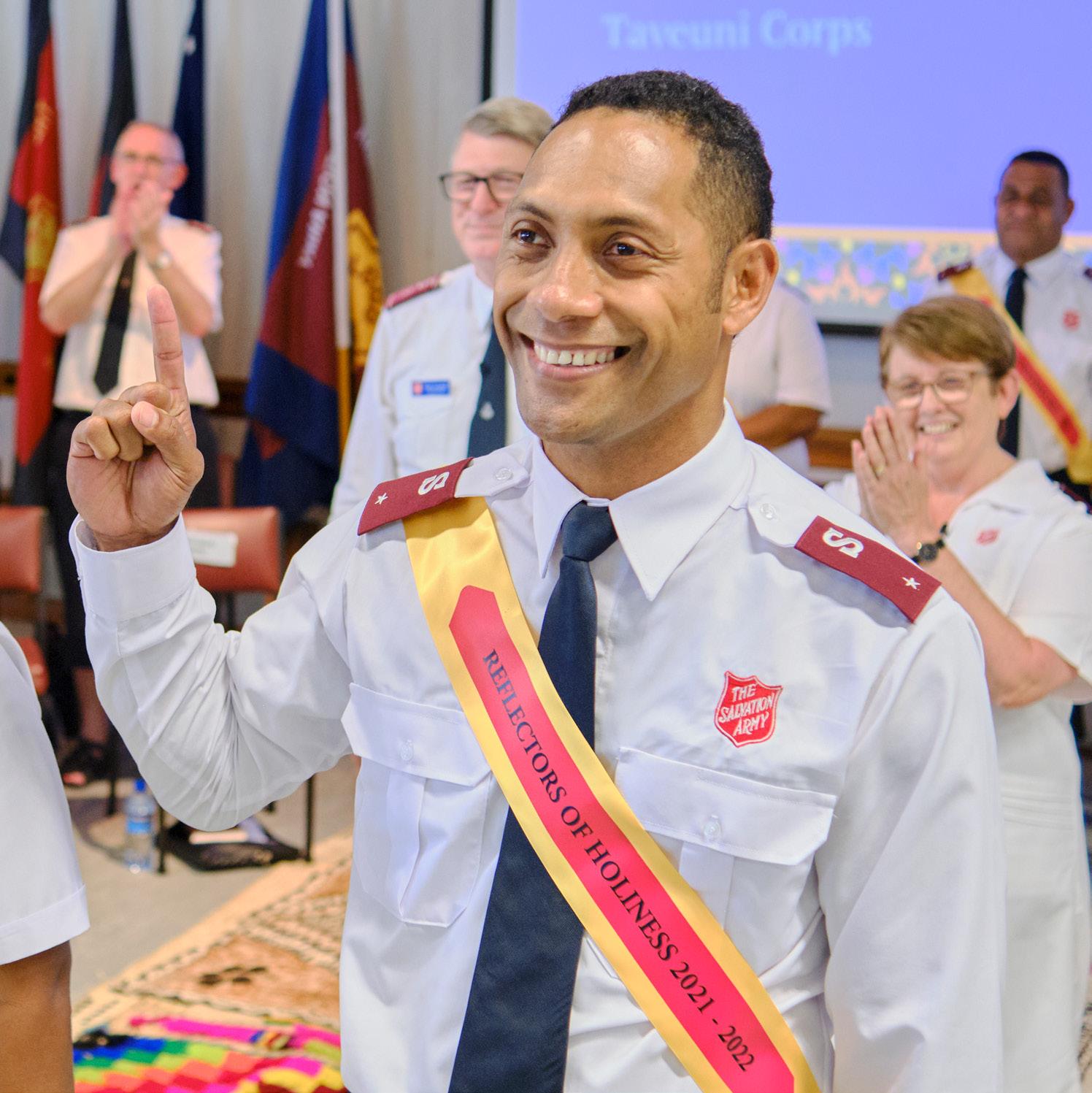
Chaplains are required to be spiritually grounded and comfortable engaging with people from all walks of life.
‘We want people to understand that homelessness is not a personal failure, it’s a societal issue’, says Petero. ‘These players are warriors. They’ve faced situations that most of us can’t imagine. But now they’re walking onto the field with their heads held high, fighting their way back with a football at their feet.’
The 2025 HWC promises to be an emotional and uplifting experience for everyone involved. For the players, it’s a chance to represent their country, often for the first time, and to rewrite their story in front of the world. For the spectators, it’s a chance to look past stereotypes and see the humanity behind homelessness.
The Salvation Army’s presence will also help shine a light on the role of faith in recovery, resilience and renewal. At its core, the HWC is about human connection, opportunity and often rediscovering meaning and purpose.
‘To be part of something so powerful, where faith meets football and lives are being transformed, that’s something I’ll never forget’, says Petero. ‘This is more than a tournament. For many of these players, it’s the beginning of a whole new chapter.’
And for the players he’ll walk alongside, that chapter may begin with a simple gesture, a prayer, a kind word or a reminder that they matter. Because at the HWC, victory isn’t just found in the final score, it’s found in every step towards hope.
You can see more about the HWC at www.homelessworldcup.org
Above: Lieutenant Petero Yavala, who will be attending the Homeless World Cup as a chaplain.
Presidential Honour
On Monday 9 June, Major Murray Sanson of the Invercargill Salvation Army became president of Invercargill East Rotary Club. Murray has been part of the club for nearly three years and connected with Rotary in his first appointment as an officer in Westport 30 years ago. A proud Rotarian, Murray says, ‘Taking up the role is about continuing a partnership with Rotary that has been tremendous over the years’. The new president hopes to raise awareness within the club of current social issues. ‘Some of the people who need the most help are right here on our doorstep. Rotarians have expertise and skills that can be used to make a real difference to people’s lives.’
For the full story, go to saltmagazine.org.nz
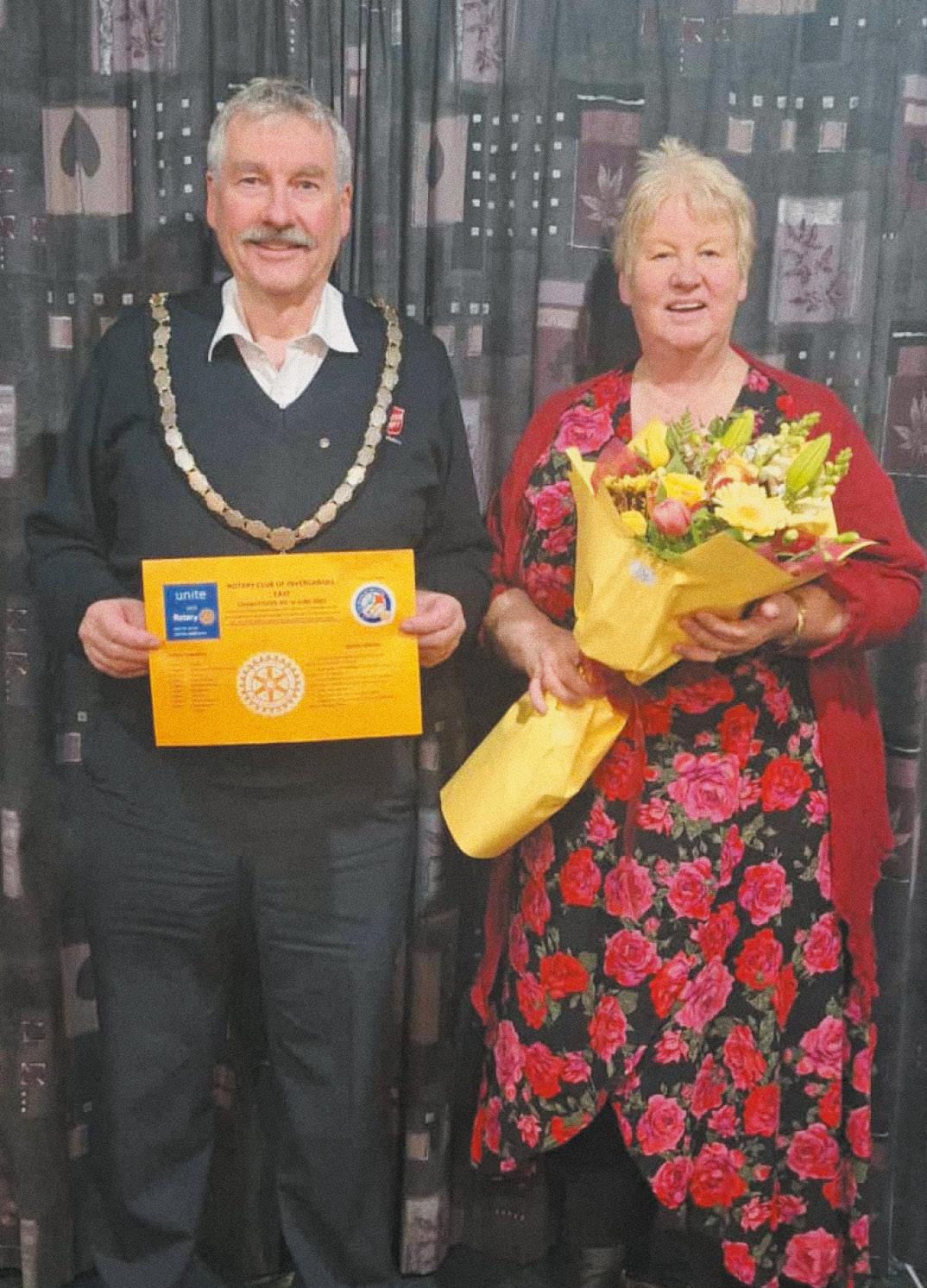
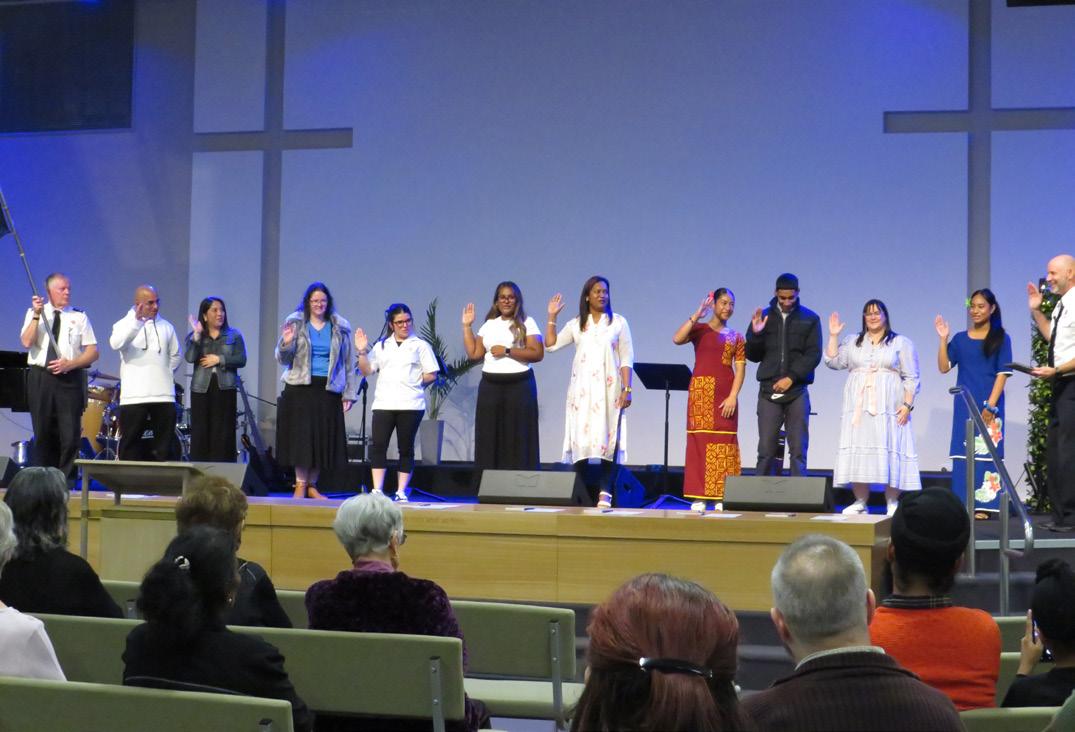
Fiti (adherent), Marion Vince (adherent), Ruth Fiti (adherent), Captain Robert Adams (corps officer).
Real Treasure at Auckland City
On Sunday 18 May, 10 new members of The Salvation Army were enrolled at Auckland City Corps. ‘Seeing everyone at the mercy seat signing their covenants was a stand-out sacred moment,’ says Captain Robert Adams. ‘It was particularly powerful to see the emotion as people came before God, with family and friends coming to pray for them. It was one of those moments that was a real treasure in the life of the corps.’ Robert adds that testimonies from new soldiers were powerful with course participants wanting to be actively involved in what The Salvation Army stands for—caring for people, transforming lives and reforming society by God’s power.
For the full story, go to saltmagazine.org.nz
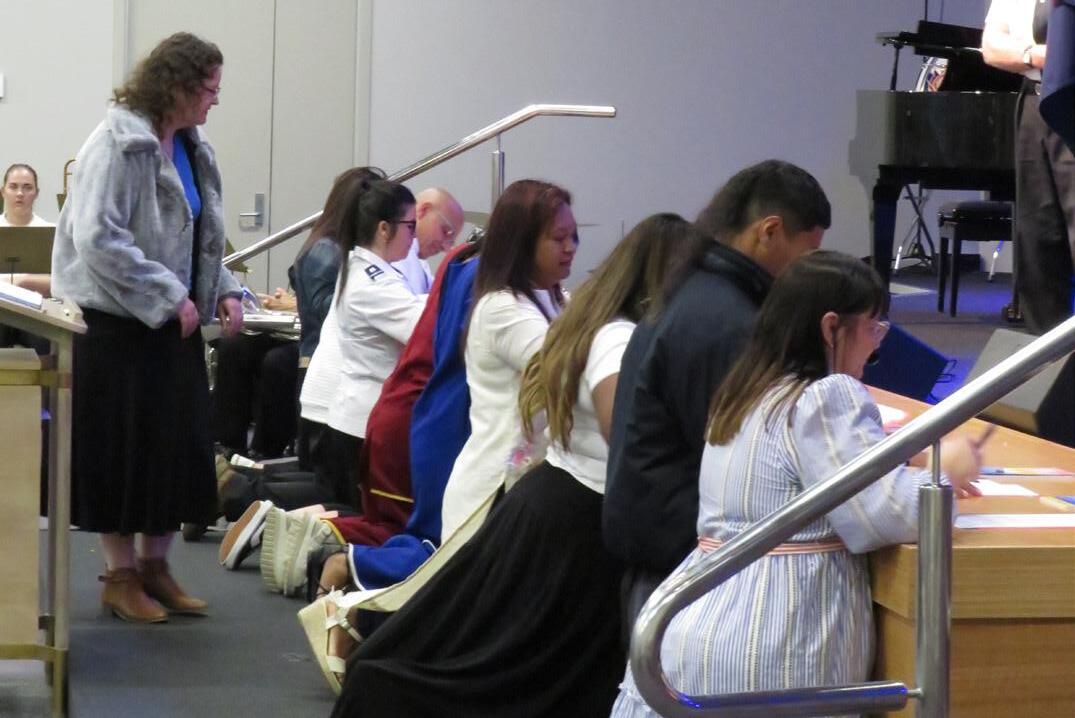
Above (from left): Majors Murray and Wendy Sanson.
Above (from left): Brent Daly (flag-bearer), Ray Heneke (soldier), Debra Heneke (soldier), Annette Perkins (adherent), Mackayla Stolk (soldier), Diya Lingam (adherent), Joti Lingam (adherent), Megan Fiti (adherent), Tim
A Healthy Future for Tonga
Programme Manager for Tonga Region’s Alcohol and Other Drugs Centre (AODC) Mele Preston was invited to speak to teenagers attending the Tongatapu District Youth Camp over the weekend of 30 May–2 June. The camp was run by Tokoaikolo Church and held at the Lavengamalie Hall in Tofoa, Tongatapu. ‘For a healthy future for Tonga, it is very important to educate our young people and train and empower them to look beyond what they are facing now. Decision-making is very important because their future depends on what they choose now,’ says Mele. The AODC runs a life skills programme specifically for youth, which includes classes on anger management, building healthy relationships, decision-making, communication and values.
For the full story, go to saltmagazine.org.nz
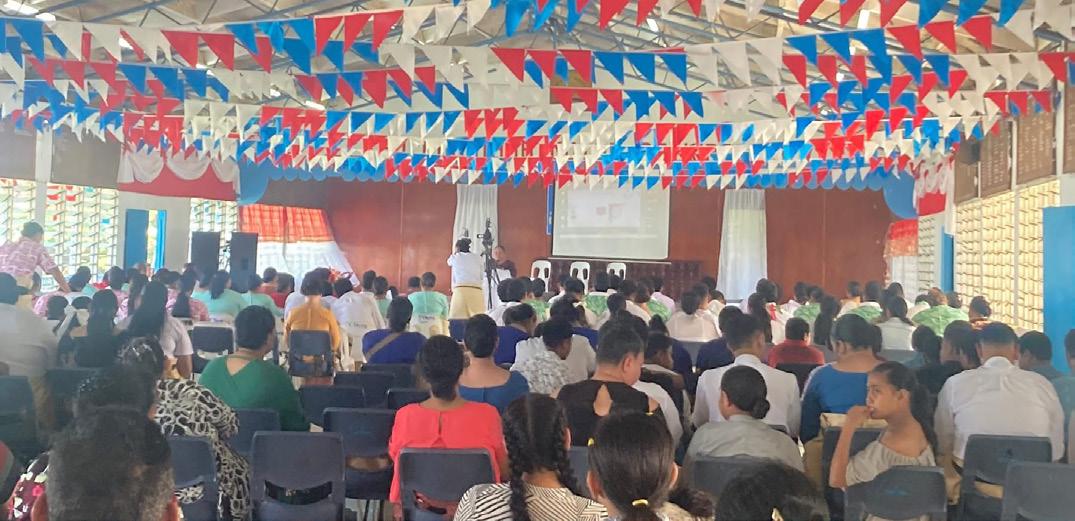
Helpful Hui
From May 27–29, the Centre for Leadership Development (CLD) in Upper Hutt ran a Mental Resilience Hui for staff and officers at Booth College of Mission—the first of its kind. CLD Director Captain Dr Malcolm Irwin explains the vision behind it. ‘We’re always learning at CLD, experimenting and probing what we have and know, to see what could be next. We held the hui to try and see what else could be helpful for our people at this critical moment.’ Hui content was presented by mental wellbeing expert Richard Black from Thriving Churches HQ and Major Mat Badger and Jules Badger, co-authors of When the Light Goes Out, with Malcolm adding further content on the shadow self. Course participants provided helpful feedback, with most saying the hui ‘exceeded expectations’.
For the full story, go to saltmagazine.org.nz
The Salvation Army Celebrates 160 Years
On 2 July 1865, William Booth preached to a crowd of people gathered at the East End of London. This moment is considered the birth of The Salvation Army, which today is a global movement that shares the love of God in 134 countries around world. In recognition of this significant anniversary, The Salvation Army International Headquarters has created eight short films chronicling the mission of the global Salvation Army over the past 160 years. The first film is available now and seven other films will be released weekly, every Wednesday. Films can be viewed on:
YouTube: youtube.com/@SalvationArmyIHQ
Vimeo: vimeo.com/salvationarmyihq
Facebook: facebook.com/SalvationArmyIHQ
IHQ website: salvationarmy.org
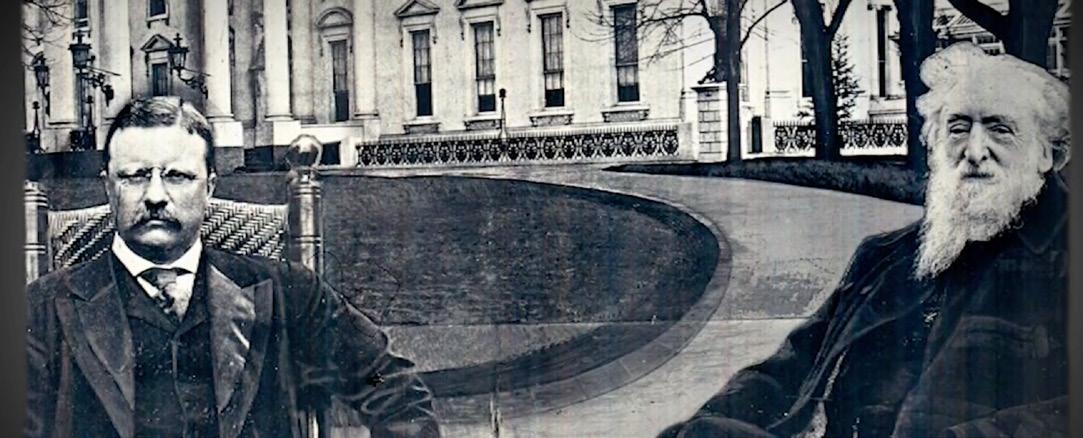
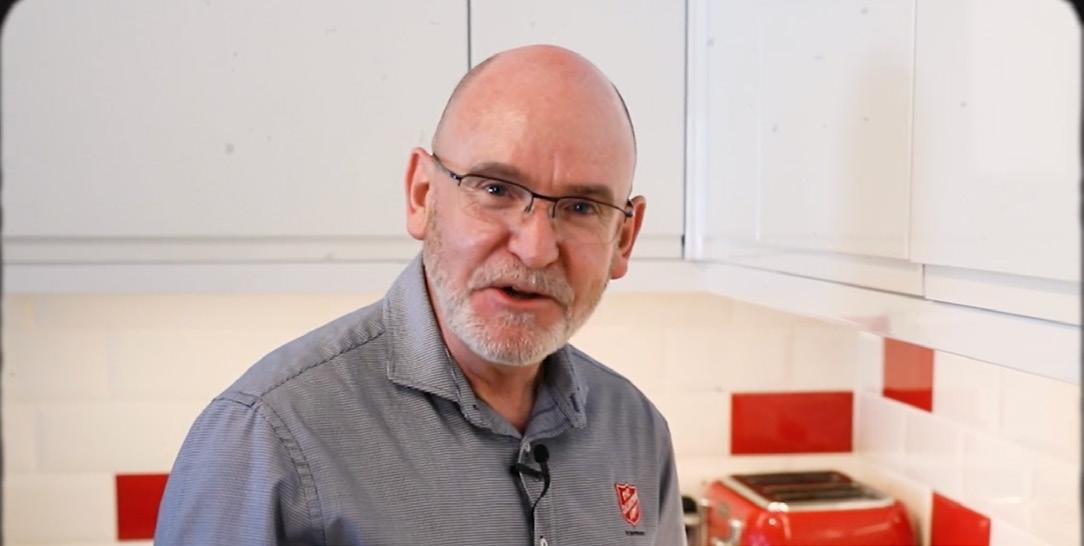
Stills from the first video. Top: US President Roosevelt with General William Booth. Bottom: Current global leader of The Salvation Army, General Lyndon Buckingham.
Looking for more news? Read the latest news online at saltmagazine.org.nz
Official Engagements
Commissioner Janine Donaldson (Territorial Commander)
7–9 July: Territorial Appointments Conference, BCM
11 July: Kingdom Conference, Tawa
13 July: Wairarapa Corps visit
17 July: Hutt Valley ministries visit
22 July: National Council of Churches meeting followed by meeting with Prime Minister
27 July: Wellington South Corps visit
Colonel Gerry Walker (Chief Secretary)
3 July: Tri-Territorial Webinar (online)
7 July: Territorial Online Praying Together meeting—winter edition
7–9 July: Territorial Appointments Conference, BCM
14 July: Meeting with QBE and Port of Auckland, Auckland
Lt-Colonel Liz Gainsford (Territorial Secretary for Spiritual Life Development)
3 July: Tri-Territorial Webinar (online)
7 July: Territorial Online Praying Together meeting—winter edition
7–9 July: Territorial Appointments Conference, BCM
13 July: Petone Corps Plant visit
Gazette Summary
To read the full version of Gazette notices, visit saltmagazine.org.nz/gazette
Bereavements: Arthur De Maine, the father-in-law of Major Christine De Maine and father of Nigel De Maine, passed away from Christchurch Hospital, on 17 May 2025. We ask you to uphold Major Christine and Nigel, along with other extended family members in your prayers during this time of grief and loss.
Promotion to Glory: Major Betsy (Bessie) Hay was promoted to Glory on Friday 30 May 2025 from Addington Gardens Care Centre, Christchurch, in her 100th year. Betsy entered The Salvation Army Training College from Greymouth Corps on 1 December 1947 as a cadet in the Warriors session. Please uphold in prayer Major Betsy Hay’s children and partners, Majors Bev and Gavin Baxter, Ruth Haslam, Majors Andrew and Sue Hay, Noeline and Merv Murray, granddaughter Captain Ruth Wilson and other family members at this time of grief and loss.
Major Donald (Don) Hutson was promoted to Glory on Wednesday 4 June 2025 from Wellington Hospital, aged 92 years. Don entered The Salvation Army Training College from Naenae Corps on 25 February 1964 as a cadet in the Proclaimers of Faith session. Please uphold in prayer Major Don’s family—Major Elizabeth Hutson, children Lt-Colonels Ian (and Lynette) Hutson, Peter Hutson, Stuart Hutson, Cheryl Hutson Roberts, granddaughter Envoy Collette Irwin and other family members at this time of grief and loss.
Army Pāpāmoa Plant. We believe that this name will align the identity of Pāpāmoa Plant to the local community and The Salvation Army’s identity, current missional footprint and long-term vision. Please continue to pray for Lieutenants Ben and Jesse Willis and the Pāpāmoa Plant leadership team, as they continue to establish themselves and serve the people in their local community.
Conclusion of cadetship: Effective immediately, the cadetship of Sara Eglinton has been concluded. Please uphold Sara in prayer in the days ahead and also the Booth College of Mission cadets, officers, staff and students as they journey through this time together.
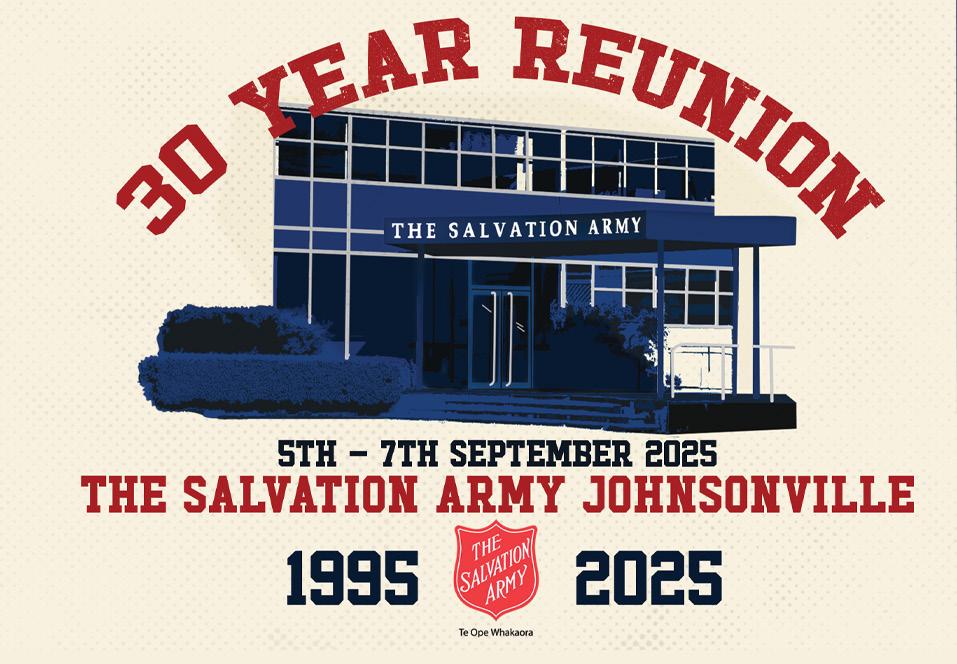
WEEKEND PROGRAMME:
Friday: 7.00pm Welcome Event
Saturday: 8.00am Men’s Breakfast
10.00am Youth & Children’s event
1.30pm Women’s High Tea
6.00pm Celebration Dinner, Quiz and Entertainment
9.30pm Delayed Rugby coverage
Sunday: 10.00am Celebration Service
Check out www.sajchurch for more information. Register your interest to: karen.white@salvationarmy.org.nz

THE SALVATION ARMY PORIRUA CORPS 60
TH ANNIVERSARY
25–26 OCTOBER 2025 Cnr Warspite Avenue and Fantame Street
For information and registration, contact nicki.dutton@salvationarmy.org.nz
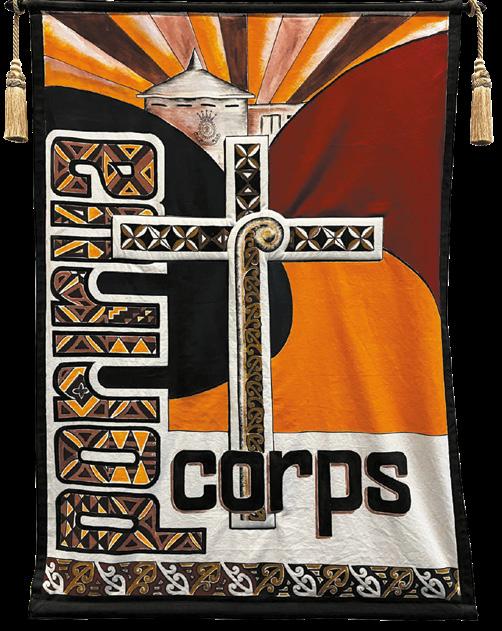
Name change: Effective immediately, we are pleased to advise that the Pacific Coast Mission is to change its name to The Salvation Quiz Answers: 1. China, 2. Broth, 3. Bread, 4. Auguste Escoffier, 5. Chowder.
SALVATIONISTS IN HISTORY
A New Structure: The Social Wing
The late Major Harold Hill’s collection of writings, To Love and Serve Him Supremely All My Days, is being published this year. The following is an excerpt from Chapter 15: ‘Out of Darkest England: The Effect of the “Darkest England Scheme” on The Salvation Army Itself’.
In ‘saving’ it, and making its name great, the scheme also altered the structure of The Salvation Army, establishing a whole new entity within its ranks. In part, this was occasioned by the need for public accountability, with the creation of the Darkest England Trust in January 1891, so that donors could be assured that their money was doing that for which they had given it. This, along with the multiplication of institutions for social work, created a whole new ‘wing’ of the movement. Instead of social work being a minor operation on the side, it became equal in scope to the field work. While there was naturally already a degree of separation in the administration of the evangelical and the limited social work of the organisation before 1890, the expansion of the latter consolidated and entrenched this demarcation. With the greatly increased number of officers engaged, social work became virtually a separate career path with, in some cases, separate training. The majority of officers would spend much, or in many cases, all of their careers in either field or social service—and sometimes ‘social’ bore a second-class officer stigma.
This was not perhaps what had been hoped for originally. According to Alex Nicol, Bramwell Booth’s earlier vision for the Army’s social work had been an integrated, soldier-based activity, an incarnational ministry:
‘He [Bramwell Booth] formed the idea in those days of subduing black patches of our city life by the sheer moral and sweetening influences of clean, happy, self-denying Christians who should voluntarily come out of their ordinary homes and go down and actually live amongst the poor and degraded.
He dreamed of a nether London honeycombed with sanctified fathers and mothers, living the Christ life among the hovels of the poor and the
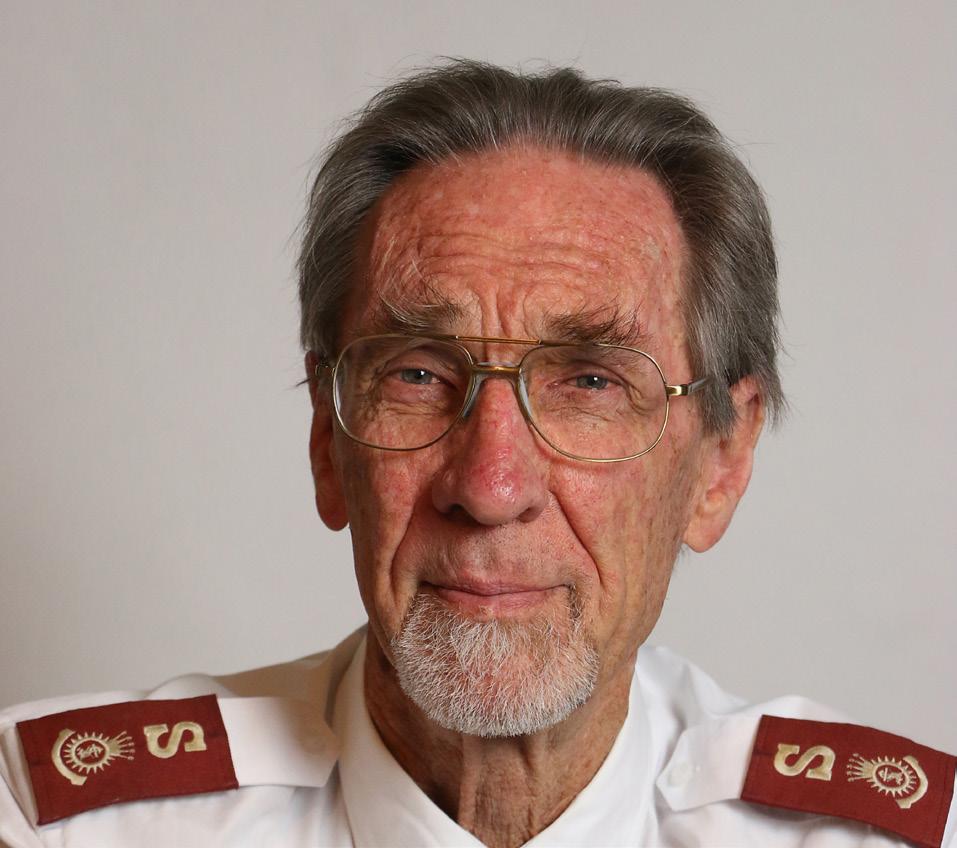
black localities of vice by day, and preaching the Gospel at night. A beautiful dream, inspired by an idealism far, far beyond the matter-offact Christianity of modern days and even the predisposition of the Salvationist to suffer for Christ’s sake.
It is interesting that at a period in the evolution of the social idea of the Army and before the Darkest England Scheme was as much as dreamt of, Mr. Bramwell Booth, the Chief of the Staff, was endeavouring to grapple with that problem of all problems, how to Christianise the heathen of England by the force of moral example, and by holy and self-sacrificing men and women living, not occasionally visiting, but actually living in the slums.’
Apart from the setting up of ‘slum posts’ (which were later superseded by other measures), Bramwell Booth’s original vision of an integrated mission did not eventuate; other voices carried the day. Any alternative to a more institutional approach would in any case have been very difficult to bring about at that time when institutional structures were the expected norm.
The way the [Darkest England] scheme eventually developed in fact led to almost separate Armies; field and social departments in every territory worked almost independently until administrative changes almost a century later.

Building Resilience
Resilience is the ability to bounce back from setbacks, adapt to change and keep going in the face of adversity. In today’s fast-paced, ever-changing world, resilience is one of the most valuable traits a child can develop.
Intentionally developing resilience in children lays the foundation for emotional strength, wellbeing, and the ability to navigate the growing stress levels reflected in rising child mental health statistics.
The American Psychological Association said: ‘Resilience is not a trait that children either have or don’t have. It involves behaviours, thoughts and actions that can be learned and developed in anyone.’ Their research encourages parents, caregivers and teachers to foster resilience in children through their interactions.
Tips for parents:
• Develop relationships: Communication, staying connected and building strong relationships are cornerstones of developing resilience in your children.
• Allow emotions: Let children know it’s okay to feel angry or frustrated. The emotion itself is not the problem, but how it is expressed can provide insight into whether they are dealing with fear or frustration.
• Don’t overprotect your child: Let them try new things and make mistakes. Healthy growth cannot occur under overprotective parenting.
• Praise effort, not just results: Focus on persistence and progress, not just outcomes.
• Maintain routines: Research suggests that babies and children thrive in structured routines. However, avoid making routines so rigid that there’s no room for trying new things.
Our aim as parents is to help children grow into confident, capable individuals, ready to face life’s ups and downs.
Resilience
‘He will be the sure foundation for your times, a rich store of salvation and wisdom and knowledge; the fear of the Lord is the key to this treasure.’ Isaiah 33:6
Read: Life feels hard sometimes—like when things don’t go our way, or we feel scared or unsure. But the Bible tells us that God is like a strong foundation, like the solid ground under a house. When we trust him, we are standing on something that won’t fall or break. Talking to God and learning about him helps us grow stronger inside, even when life is tough.
My
Shield Superpower
Everyone is good at something. In the Bible, God says that he has given us gifts, talents and personal strengths. Think about what your superpowers might be. This could be a skill, like basketball or singing, but it might be something like being kind or being brave. Once you have come up with your superpowers, write them on the shield.
You can download more shields and instructions at: saltmagazine.org.nz/ resources
Think: Our verse talks about ‘the fear of the Lord’, but that doesn’t mean being scared like in a spooky movie. It means showing God respect and knowing how big and amazing he is. When we remember how powerful and loving God is, it helps us feel safe and brave.

Pray: Dear God, thank you for being my strong foundation. When I feel worried or things are hard, help me remember that I can always talk to you. Thank you for listening and for always doing what’s best for me, even when I don’t understand it right away. Amen.
Do: Design a shield that represents your personal strengths. These are your superpowers. You can write words or draw pictures and symbols. Cut around the shield and stick it on your mirror or on your pin board, as a reminder of how special and talented you are! If you don’t know your superpowers, ask your parent, caregiver or close friend or teacher to help you.
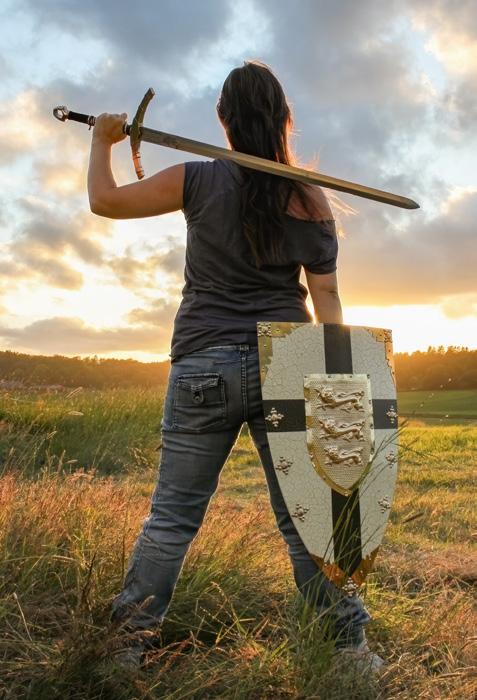

‘I have said these things to you, that in me you may have peace. In the world you will have tribulation. But take heart; I have overcome the world.’
John
16:33, ESV
